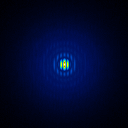 | 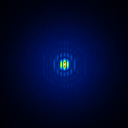 | 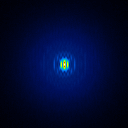 | 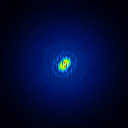 |
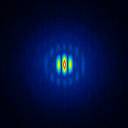 | 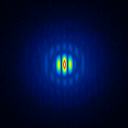 | 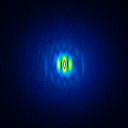 | 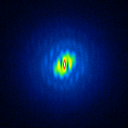 |
This test investigates the dependency of the reconstruction error on overlap errors (flexure). For this test, the beam position error is composed of a fixed offset and a gaussian distributed jitter.
The setup of the simulation is described in table 1. The input data for the test uses a strehl value of 0.30 for target and calibrator. The calibrator has a magnitude of 14. In addition, the target and psf star PSF are influenced by a beam position error (overlap error).
Each beam position error is described by two values: a fixed offset and a small jitter given in airy disc radii (1.22 λ/D). For the offset error values from 0.0 (no offset) up to 1.0 in steps of 0.2 and for the jitter 0.0 (no jitter), 0.1, and 0.2 are used.
In order to generate a PSF (target and calibrator), for each position angle, a random angle (uniform distribution) is calculated. The first beam is shifted along this angle from the nominal position by the specified offset. The second beam is shifted into the opposite direction. Therefore the total overlap error is doubled. For each phase screen, a small additional jitter is calculated by generating a random angle (uniform distribution) and a random deviation (gaussian distribution with the standard deviation given as jitter). This means, that for a PSF the average beam position is fixed, but for each phase screen a small random deviation is calculated.
| Parameter | Description |
|---|---|
| Atmosphere/AO | The AO delivers a strehl of about 30 percent for the target and the psf star. The psfs are separately simulated and therefore not equal! |
| Optics/Telescope | The optics/telescope will lead to a beam position error due to aberrations and/or flexure. A position offset between 0.0 (no offset) and 1.0 airy disc radii in steps of 0.2 and a position jitter of 0.0 (no jitter), 0.1, and 0.2 are used. |
| Observation | The observation target is NGC4151 with an overlayed dust tori (simulated) at 10.1mag integral brightness. The brightness of the psf-star is set to 14mag. For each position angle (108, 144, 180, 216, 252 degree) an image equivalent to 60s exposure time was created. The wavelength was 1.2 micron (whole J-Band) and 2.2 micron (whole K-band). |
The raw data were generated according to the common scheme described in section Overview. In addition the phase screens for the psfs are influenced by a beam position error on both pupils, and the images for the target and psf-star are generated separately which means, that the psf-star image is not influenced by the target (no halo, etc.) and shows a different position error.
All simulated input data for the LN DRS pipeline are available as a tar-file (ex5_j_input.tar.gz (91MB) and ex5_k_input.tar.gz (101MB)). The corresponding results are also available as tar files (ex5_j_results.tar.gz (9.8MB) and ex5_k_results.tar.gz (11MB)).
The generated calibrator raw images are shown in section Calibrator. The raw images and deconvolution results are shown in section Raw Frames and Results for an AGN for the AGN and section Raw Frames and Results for a Star Cluster for the star cluster.
The simulated raw LBT interferograms used for the deconvolution are ideal images, they are not influenced by detector effects like different pixel gain or bad pixels. In figure 1 the calibrators for different overlap errors (position angle 108 degree) are shown.
 |  |  |  |
 |  |  |  |
The basis of the simulation is an image of NGC4151 with an overlayed dust torus (see figure 1. The simulated raw images for a position angle of 108 degree are shown in figure 2.
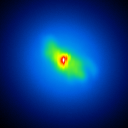 | 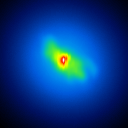 | 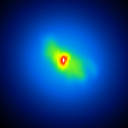 | 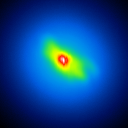 |
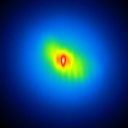 | 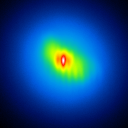 | 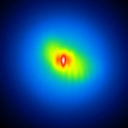 | 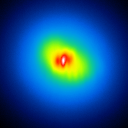 |
A comparison of the reconstructions depending on the phase error is presented in figure 3 for the J-Band. For the K-Band the results are presented in figure 4.
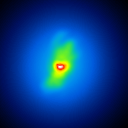 | 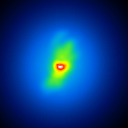 | 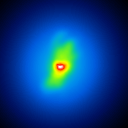 | 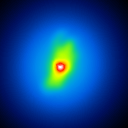 |
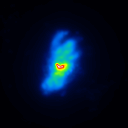 | 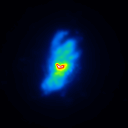 | 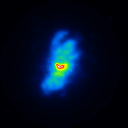 | 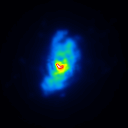 |
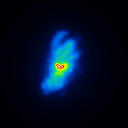 | 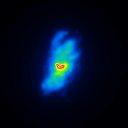 | 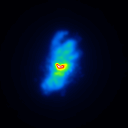 | 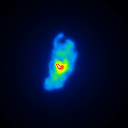 |
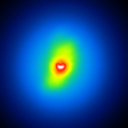 | 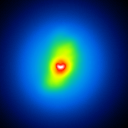 | 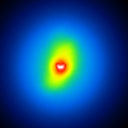 | 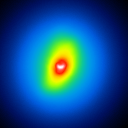 |
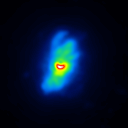 | 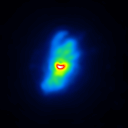 | 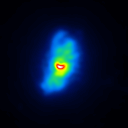 | 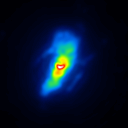 |
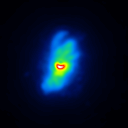 | 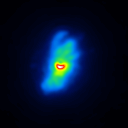 | 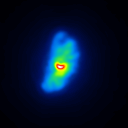 | 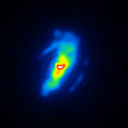 |
In table 2 (J-Band) and table 3 (K-Band) the errors for the star cluster depending on the beam overlap error are presented. In figure 5 the image errors depending on the beam overlap error are shown.
| Testcase | Richardson-Lucy | Building-Block |
|---|---|---|
| Overlap Error | Image Error | Image Error |
| 0.0 0.0 | 0.013 (0.013) | 0.007 (0.007) |
| 0.0 0.1 | 0.013 (0.013) | 0.008 (0.008) |
| 0.0 0.2 | 0.015 (0.015) | 0.008 (0.008) |
| 0.2 0.0 | 0.014 (0.014) | 0.009 (0.009) |
| 0.2 0.1 | 0.018 (0.018) | 0.013 (0.013) |
| 0.2 0.2 | 0.016 (0.016) | 0.010 (0.010) |
| 0.4 0.0 | 0.033 (0.033) | 0.029 (0.029) |
| 0.4 0.1 | 0.031 (0.031) | 0.027 (0.027) |
| 0.4 0.2 | 0.023 (0.023) | 0.019 (0.019) |
| 0.6 0.0 | 0.079 (0.079) | 0.078 (0.078) |
| 0.6 0.1 | 0.034 (0.034) | 0.033 (0.033) |
| 0.6 0.2 | 0.023 (0.023) | 0.014 (0.014) |
| 0.8 0.0 | 0.069 (0.067) | 0.076 (0.076) |
| 0.8 0.1 | 0.167 (0.166) | 0.166 (0.166) |
| 0.8 0.2 | 0.077 (0.077) | 0.078 (0.078) |
| 1.0 0.0 | 0.125 (0.125) | 0.144 (0.144) |
| 1.0 0.1 | 0.166 (0.162) | 0.174 (0.174) |
| 1.0 0.2 | 0.194 (0.192) | 0.190 (0.190) |
| Testcase | Richardson-Lucy | Building-Block |
|---|---|---|
| Overlap Error | Image Error | Image Error |
| 0.0 0.0 | 0.020 (0.020) | 0.013 (0.013) |
| 0.0 0.1 | 0.018 (0.018) | 0.013 (0.013) |
| 0.0 0.2 | 0.024 (0.024) | 0.012 (0.012) |
| 0.2 0.0 | 0.025 (0.025) | 0.017 (0.017) |
| 0.2 0.1 | 0.022 (0.022) | 0.013 (0.013) |
| 0.2 0.2 | 0.022 (0.022) | 0.012 (0.012) |
| 0.4 0.0 | 0.031 (0.031) | 0.025 (0.025) |
| 0.4 0.1 | 0.032 (0.032) | 0.024 (0.024) |
| 0.4 0.2 | 0.066 (0.066) | 0.054 (0.054) |
| 0.6 0.0 | 0.093 (0.093) | 0.087 (0.087) |
| 0.6 0.1 | 0.073 (0.073) | 0.072 (0.072) |
| 0.6 0.2 | 0.126 (0.125) | 0.119 (0.119) |
| 0.8 0.0 | 0.139 (0.134) | 0.138 (0.138) |
| 0.8 0.1 | 0.085 (0.085) | 0.087 (0.087) |
| 0.8 0.2 | 0.099 (0.097) | 0.100 (0.100) |
| 1.0 0.0 | 0.217 (0.210) | 0.232 (0.232) |
| 1.0 0.1 | 0.272 (0.272) | 0.300 (0.300) |
| 1.0 0.2 | 0.171 (0.154) | 0.191 (0.191) |
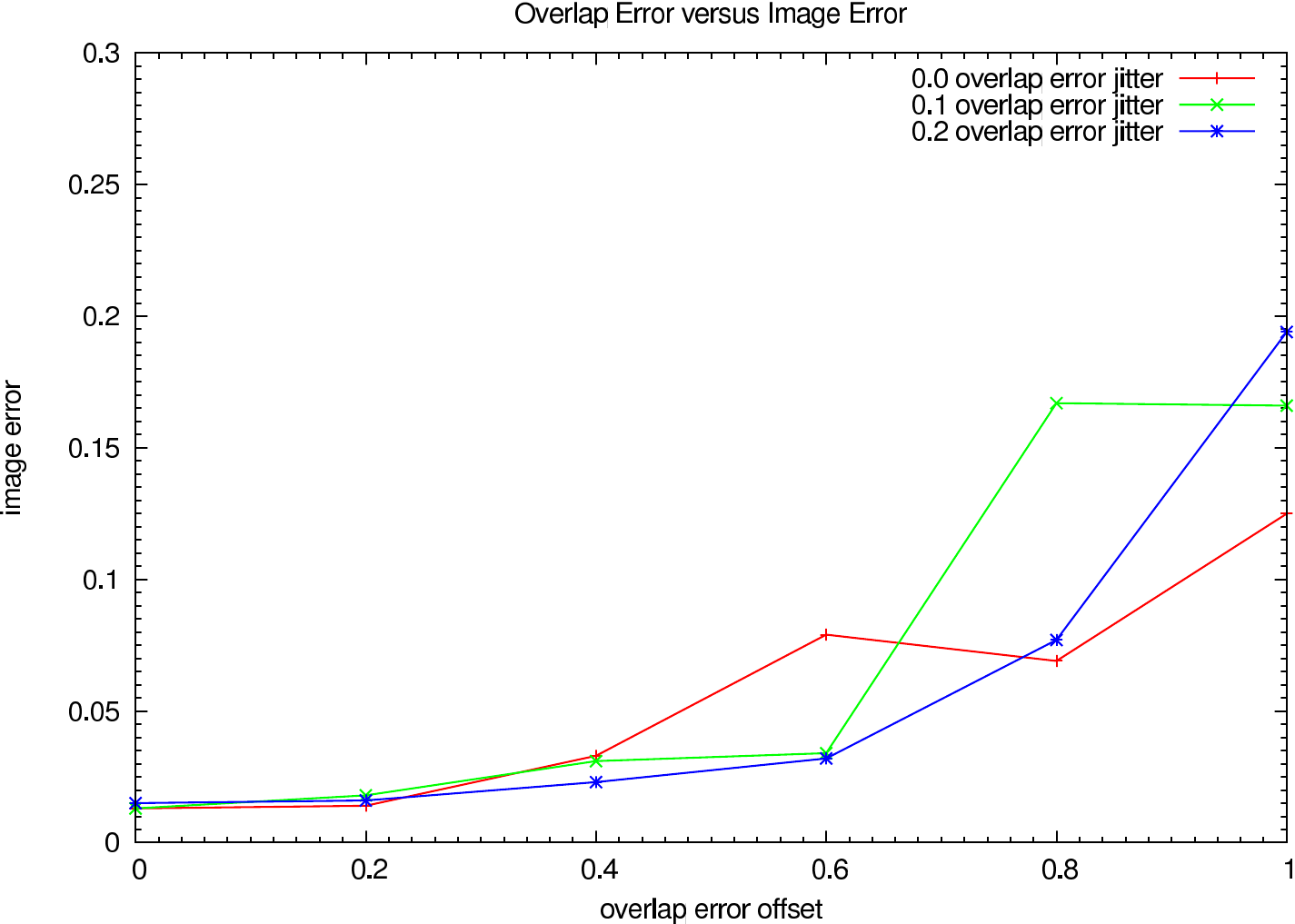 | 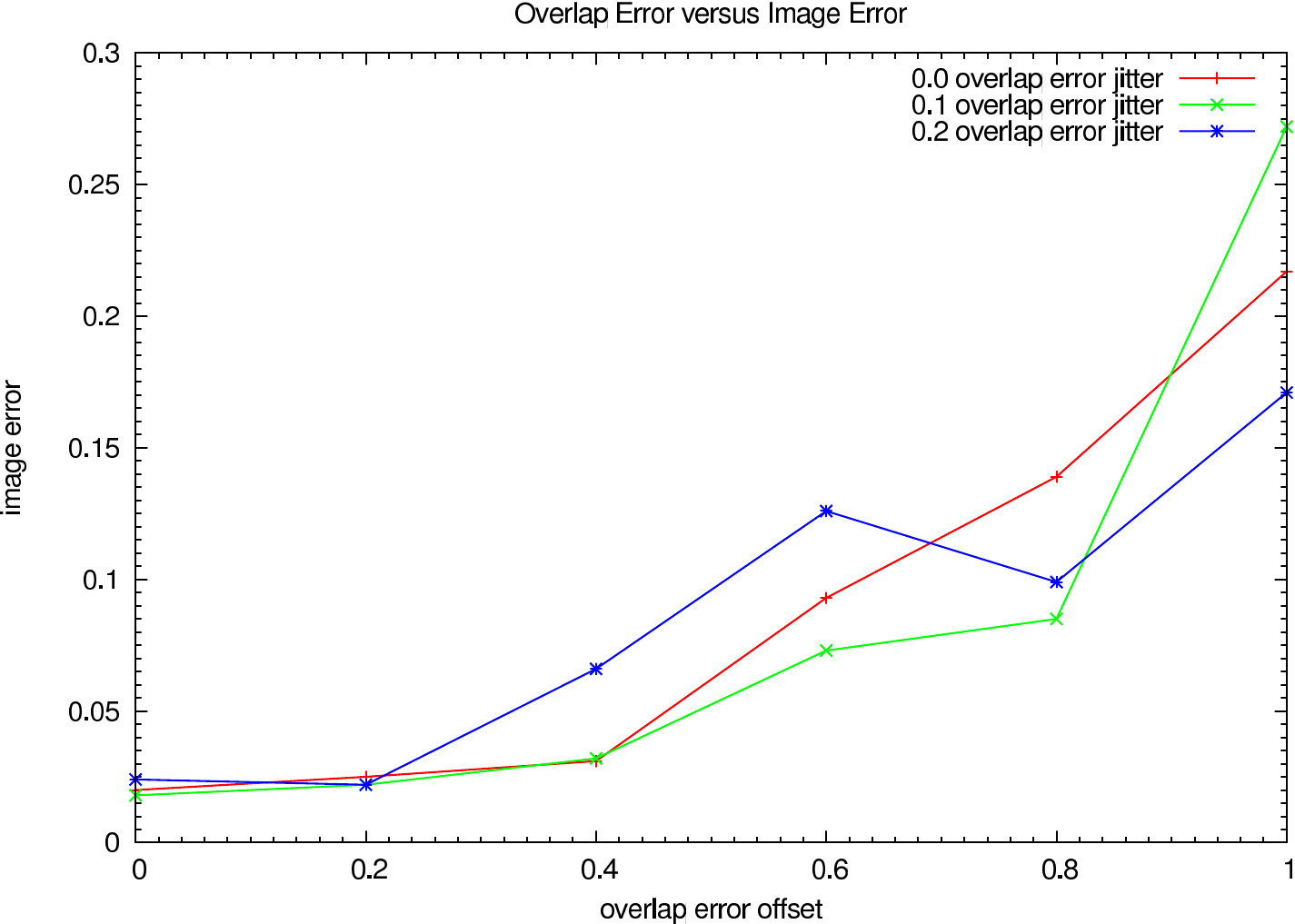 |
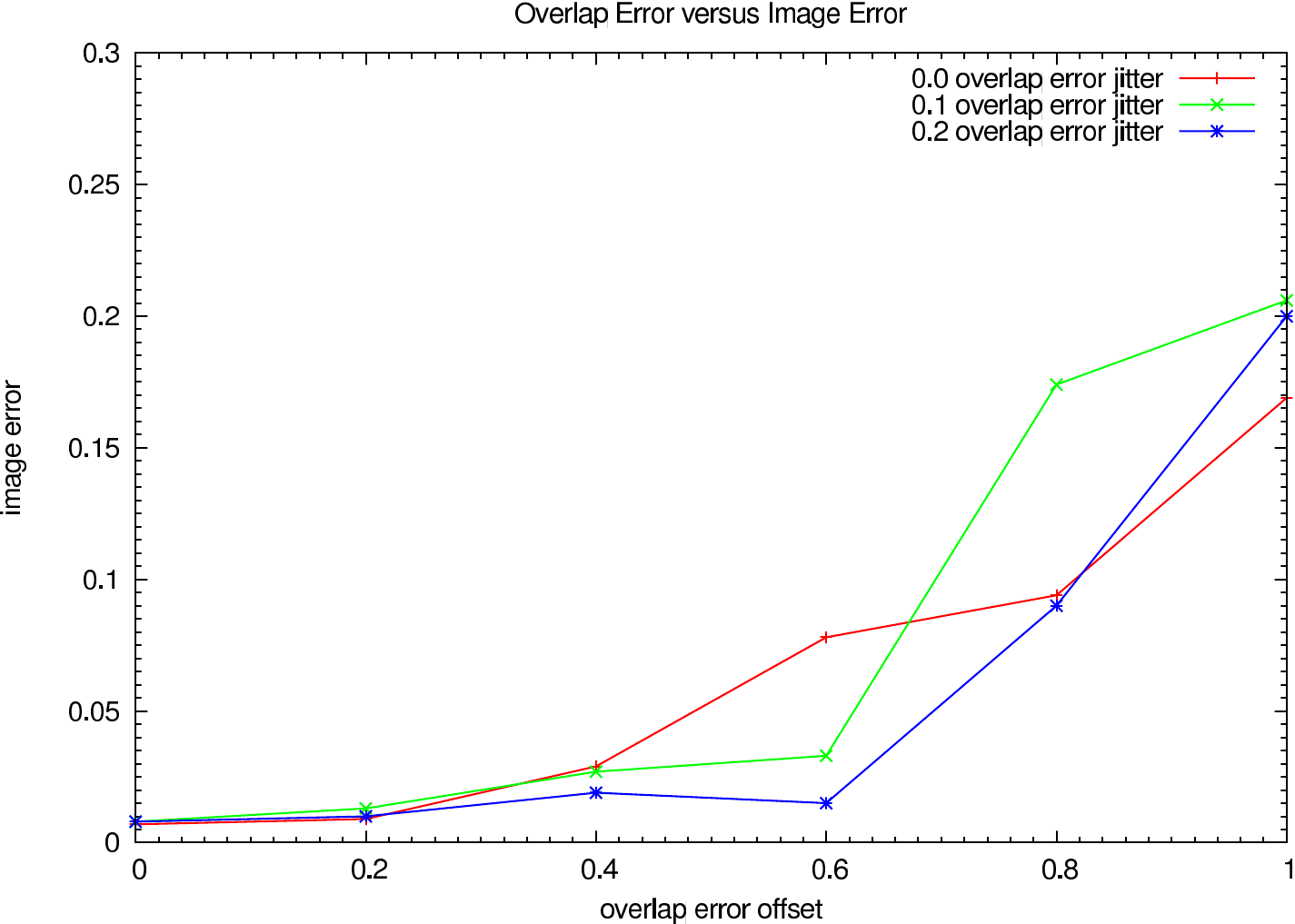 | 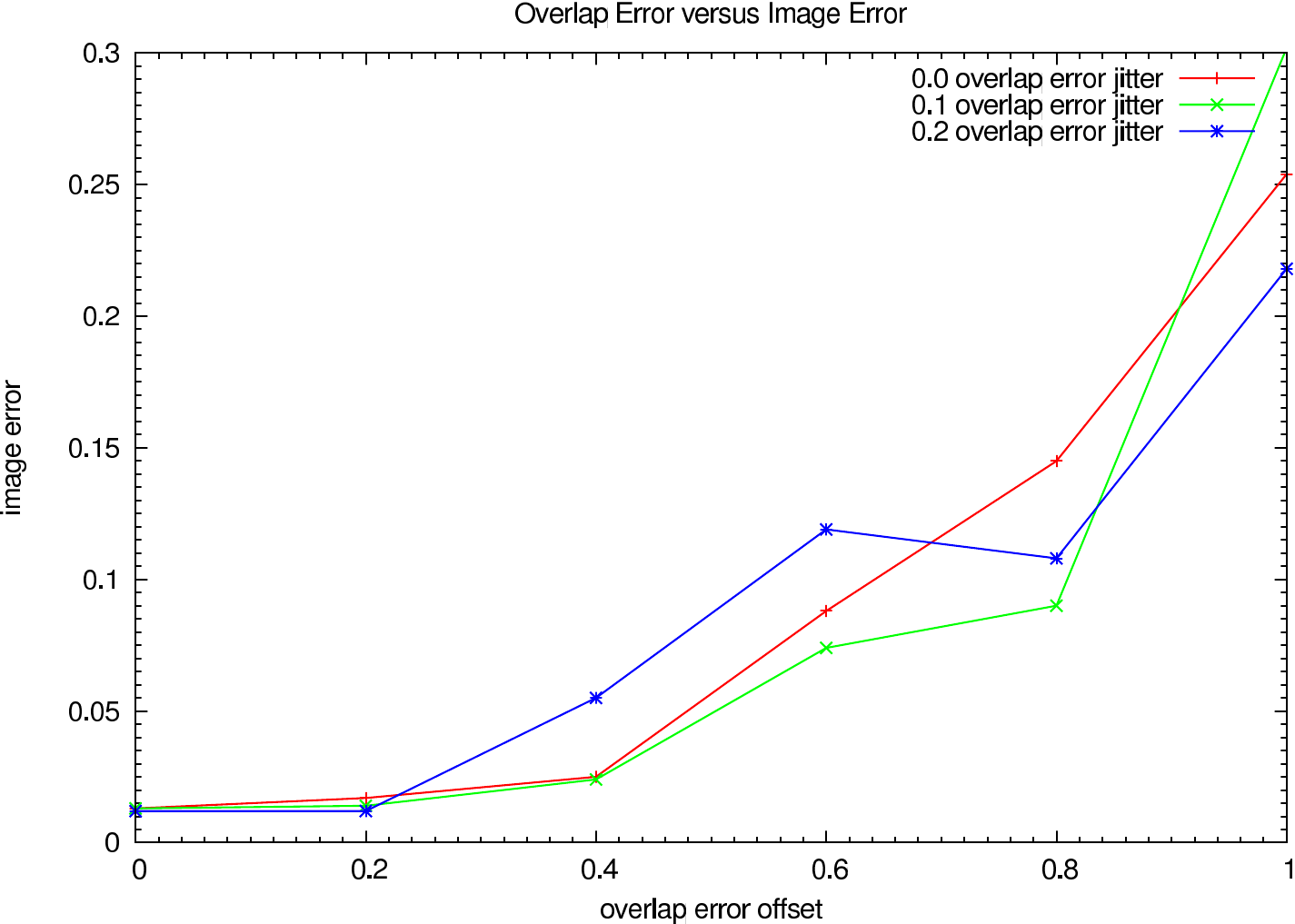 |
In figure 6 the image error describing the difference between the reconstruction and the reference image is shown for each iteration (in steps of 100 iterations). The effect of the beam overlap error on the reconstruction error and the optimal iteration number is clearly visible.
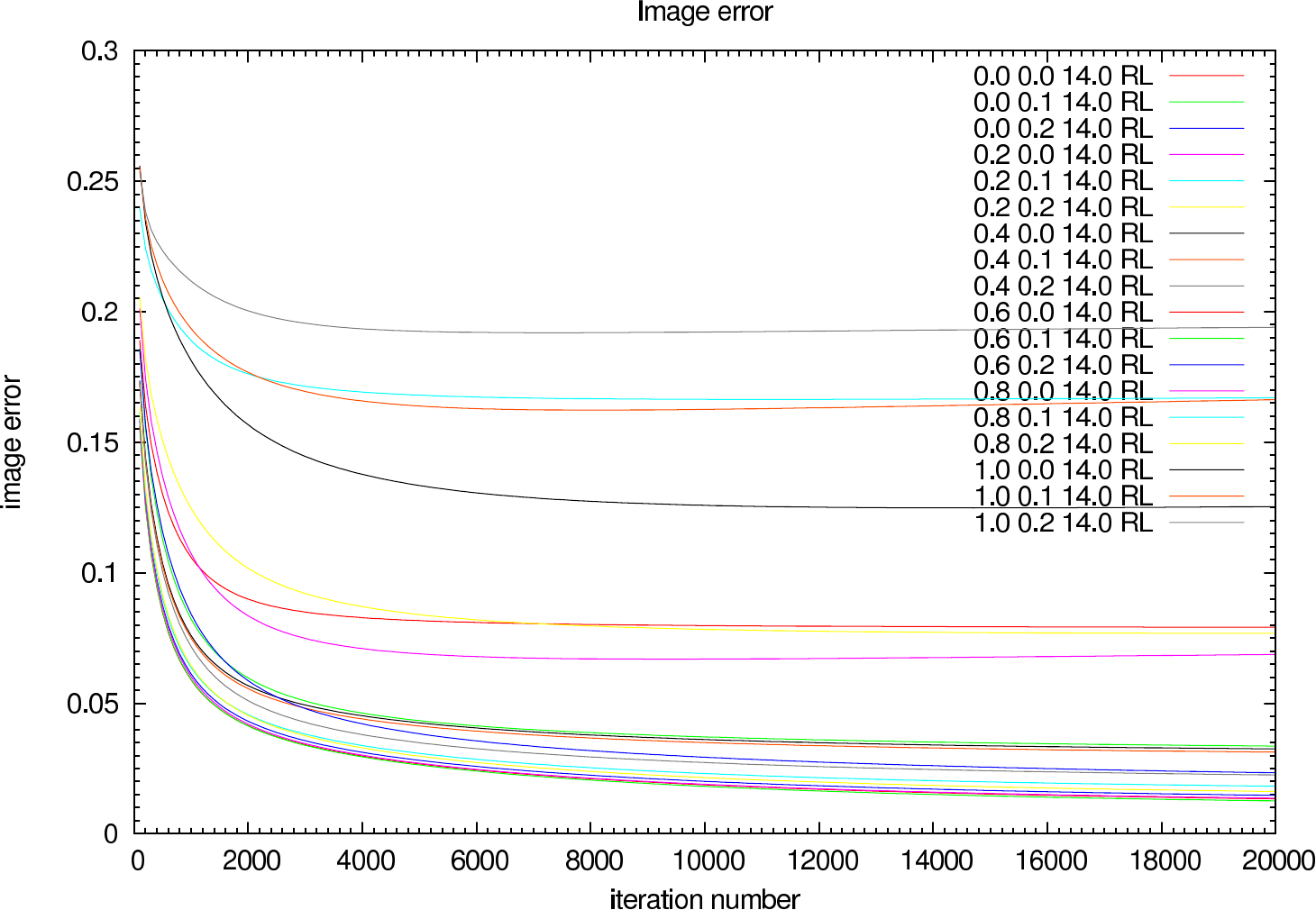 | 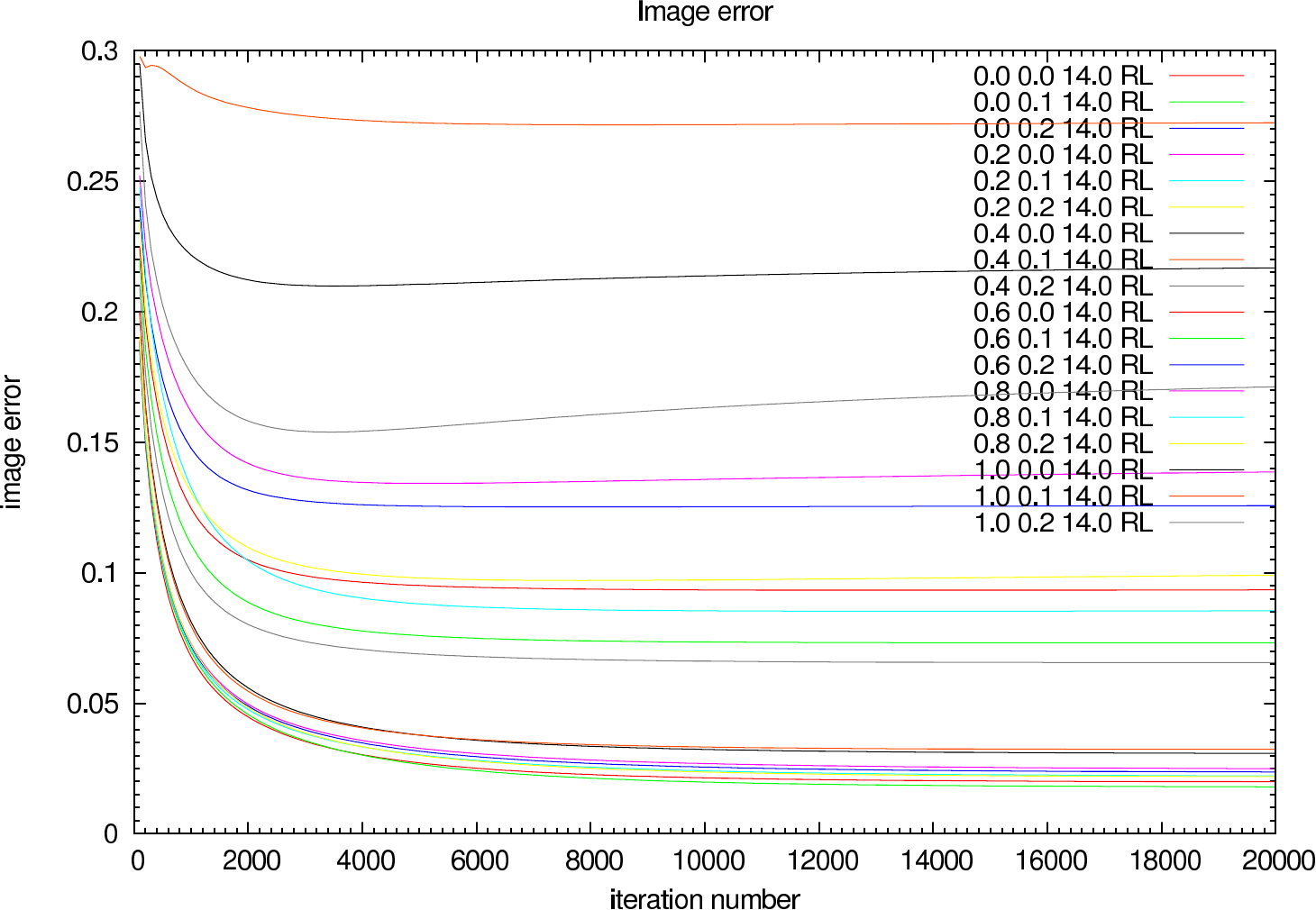 |
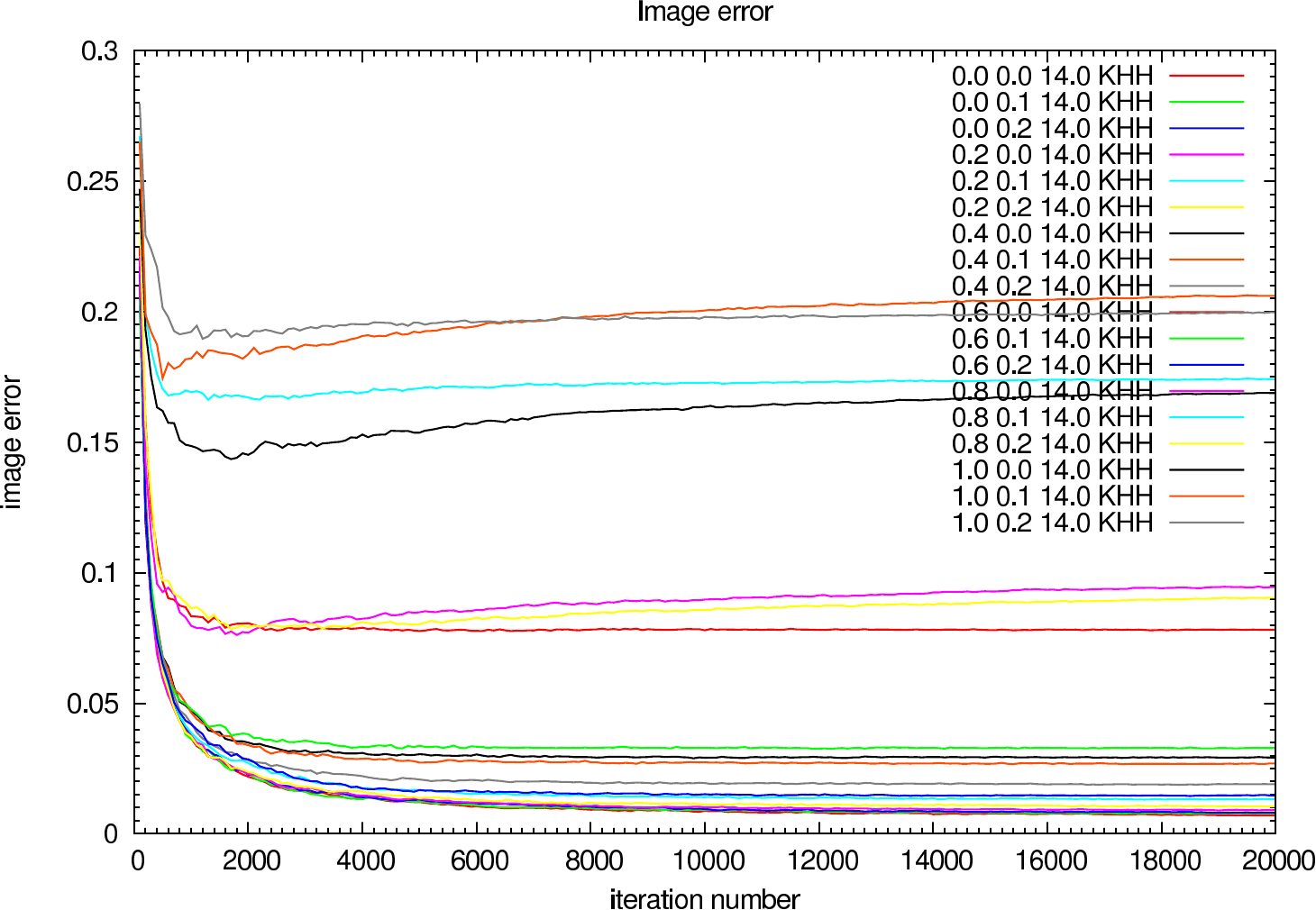 | 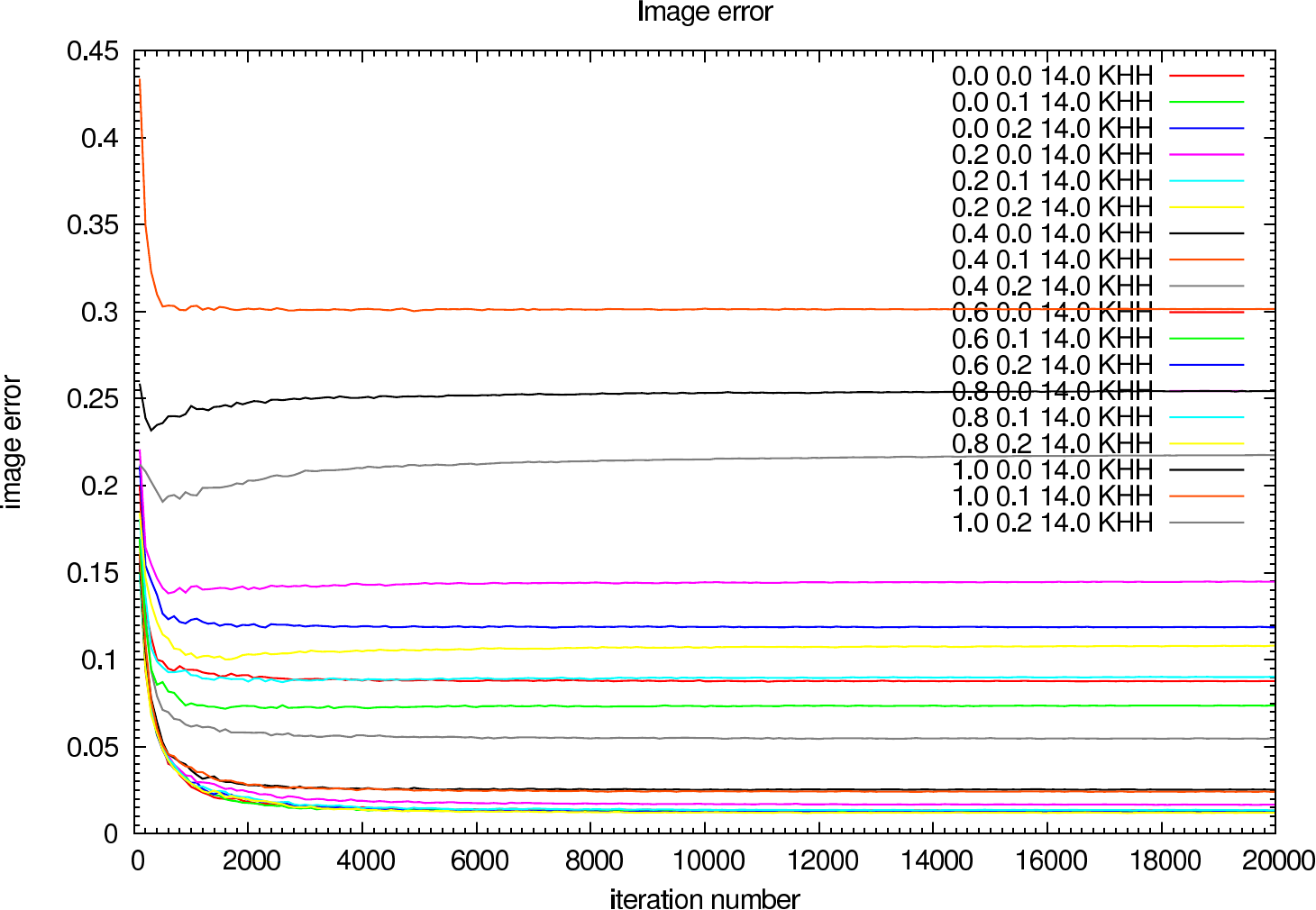 |
In figure 7 (J-Band) and figure 8 (K-Band) a horizontal cut slightly above the intensity maximum of the reconstructions of NHC4151 compared with the ideal reference image is shown.
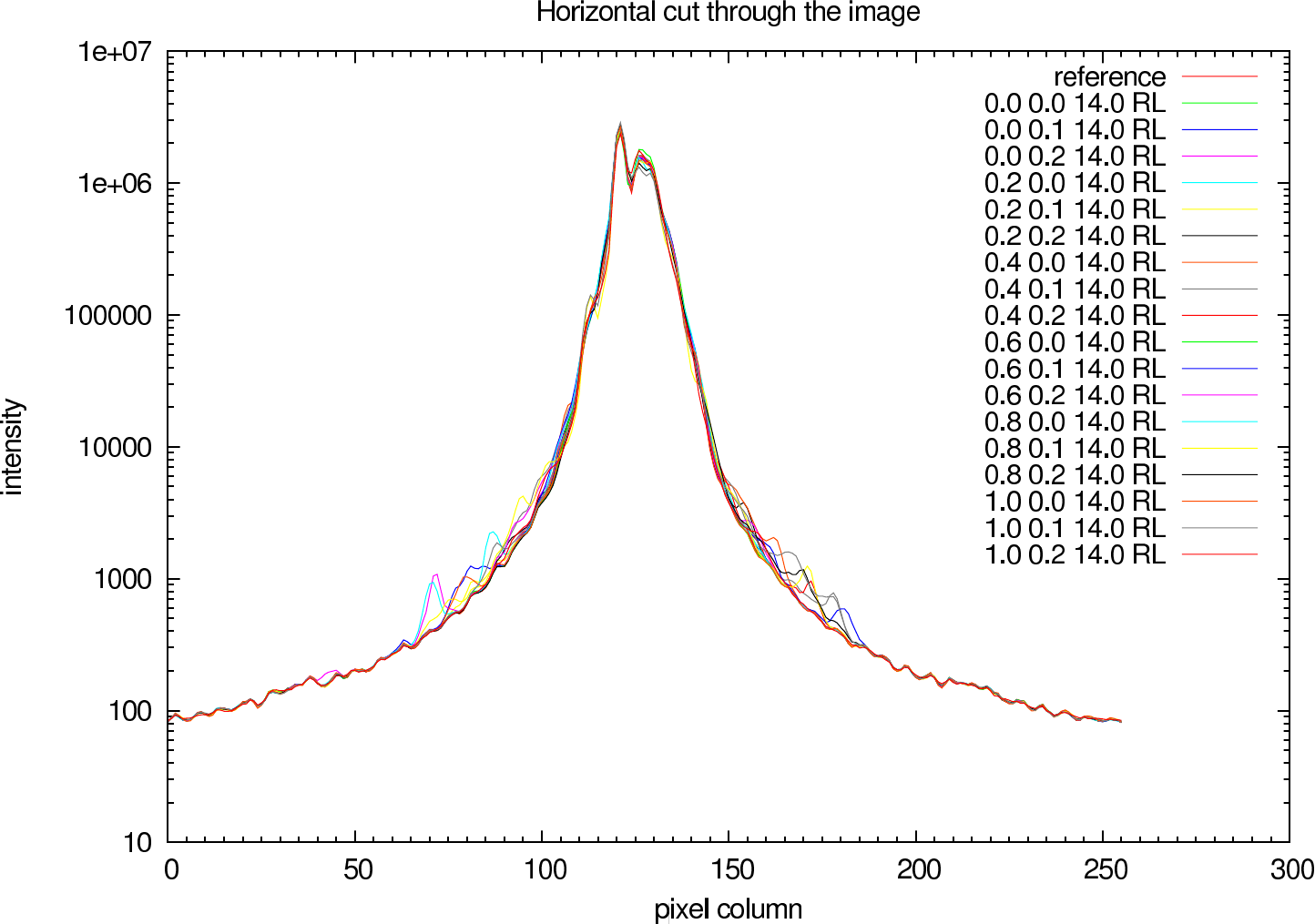 | 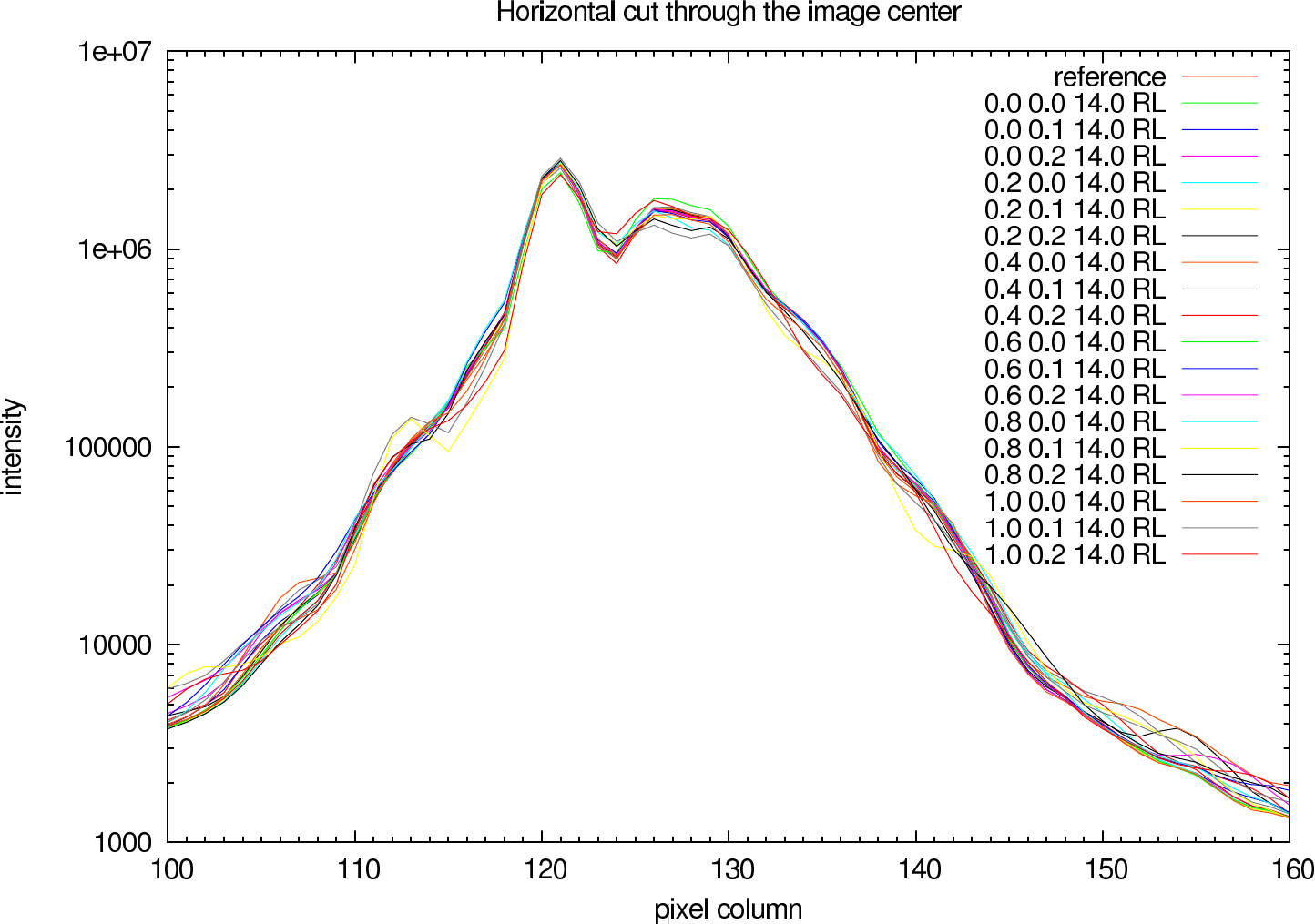 |
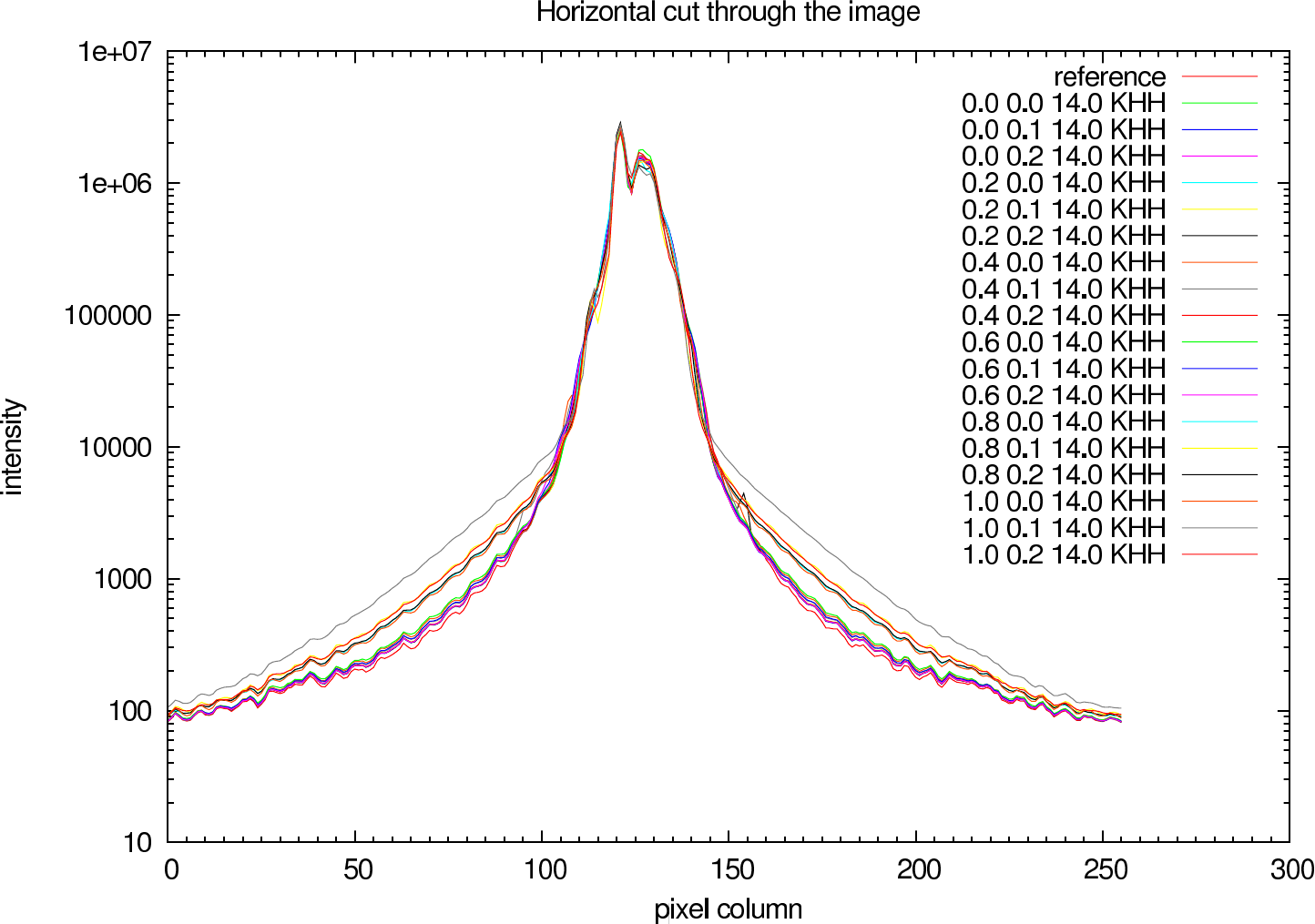 | 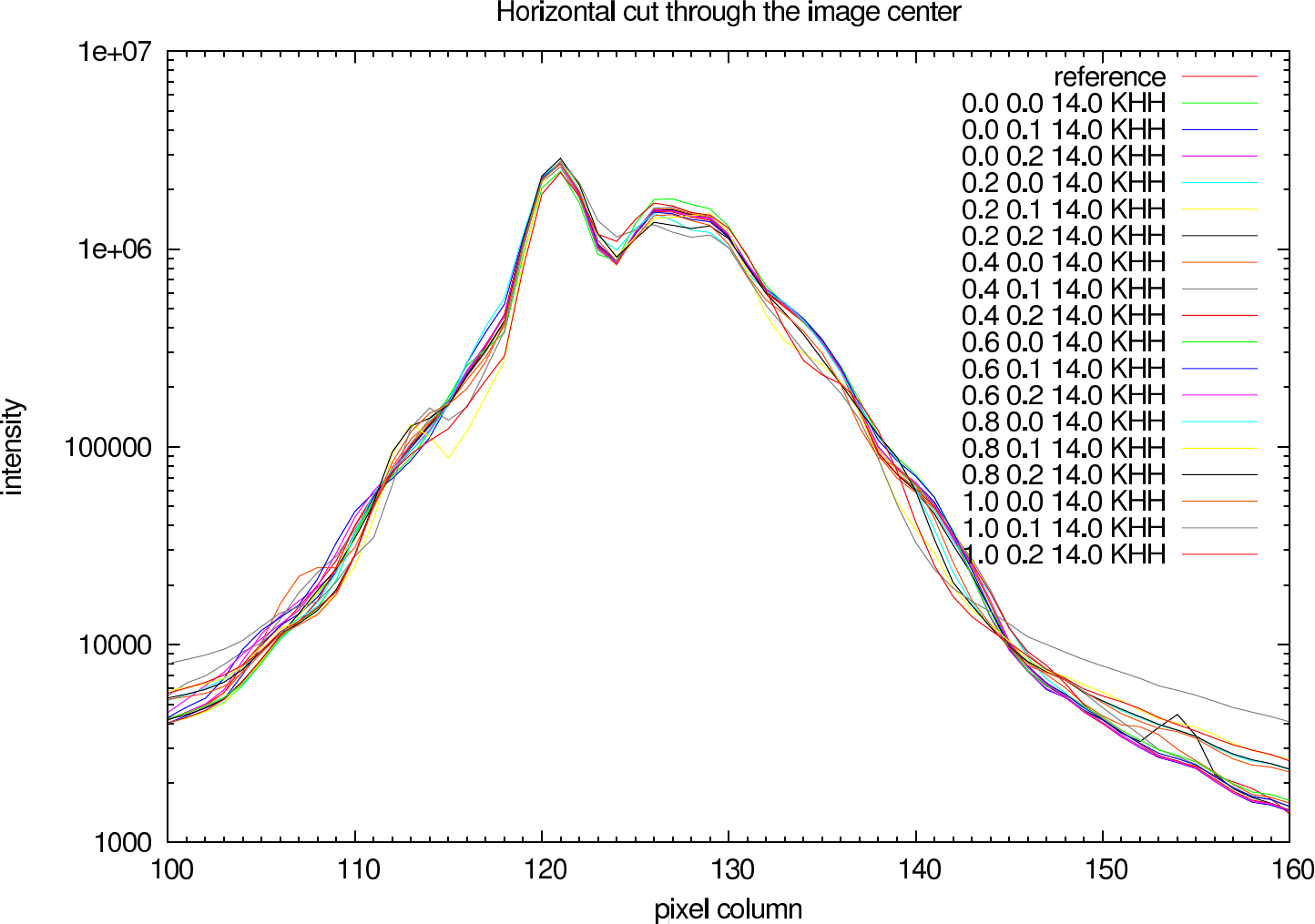 |
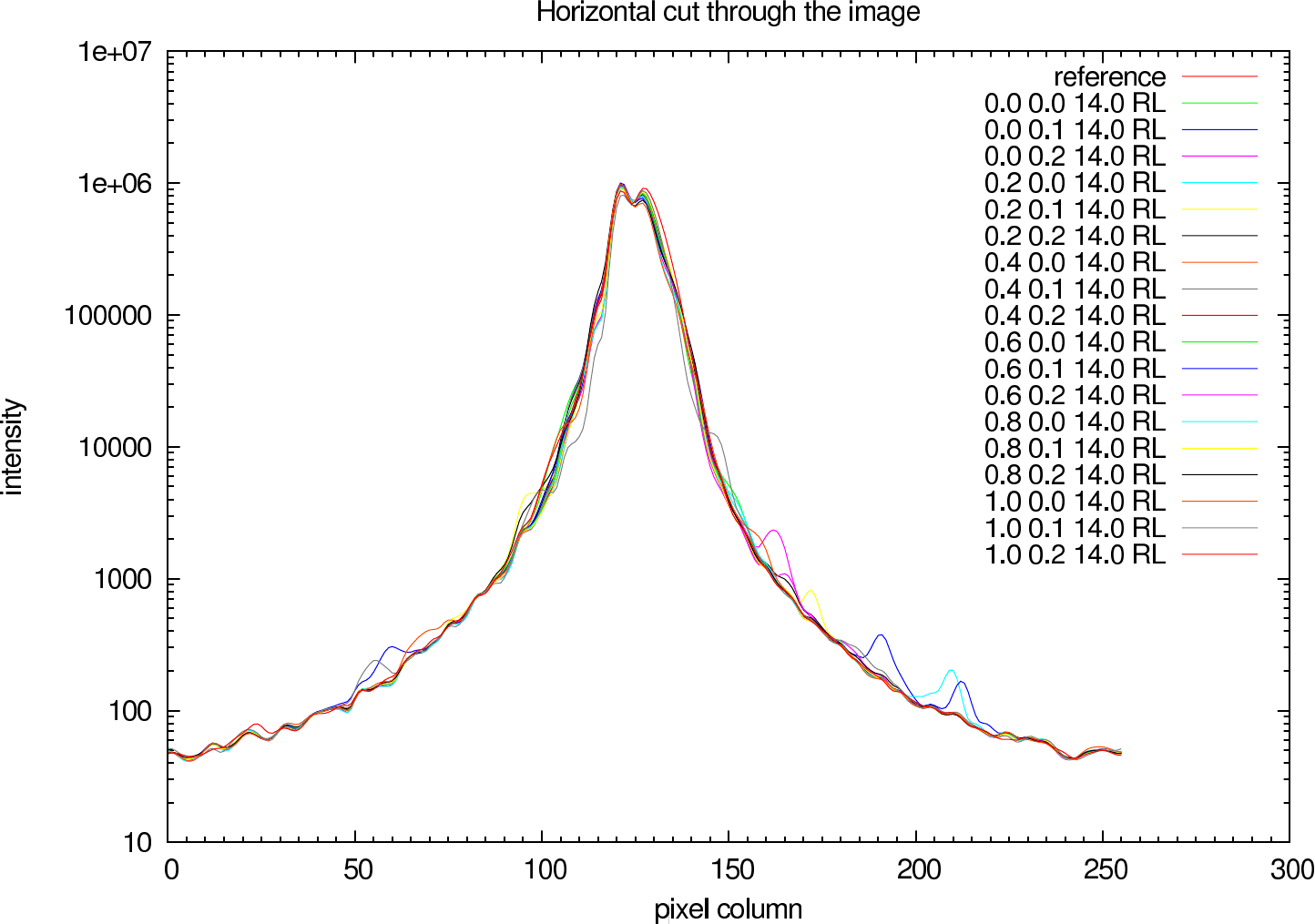 | 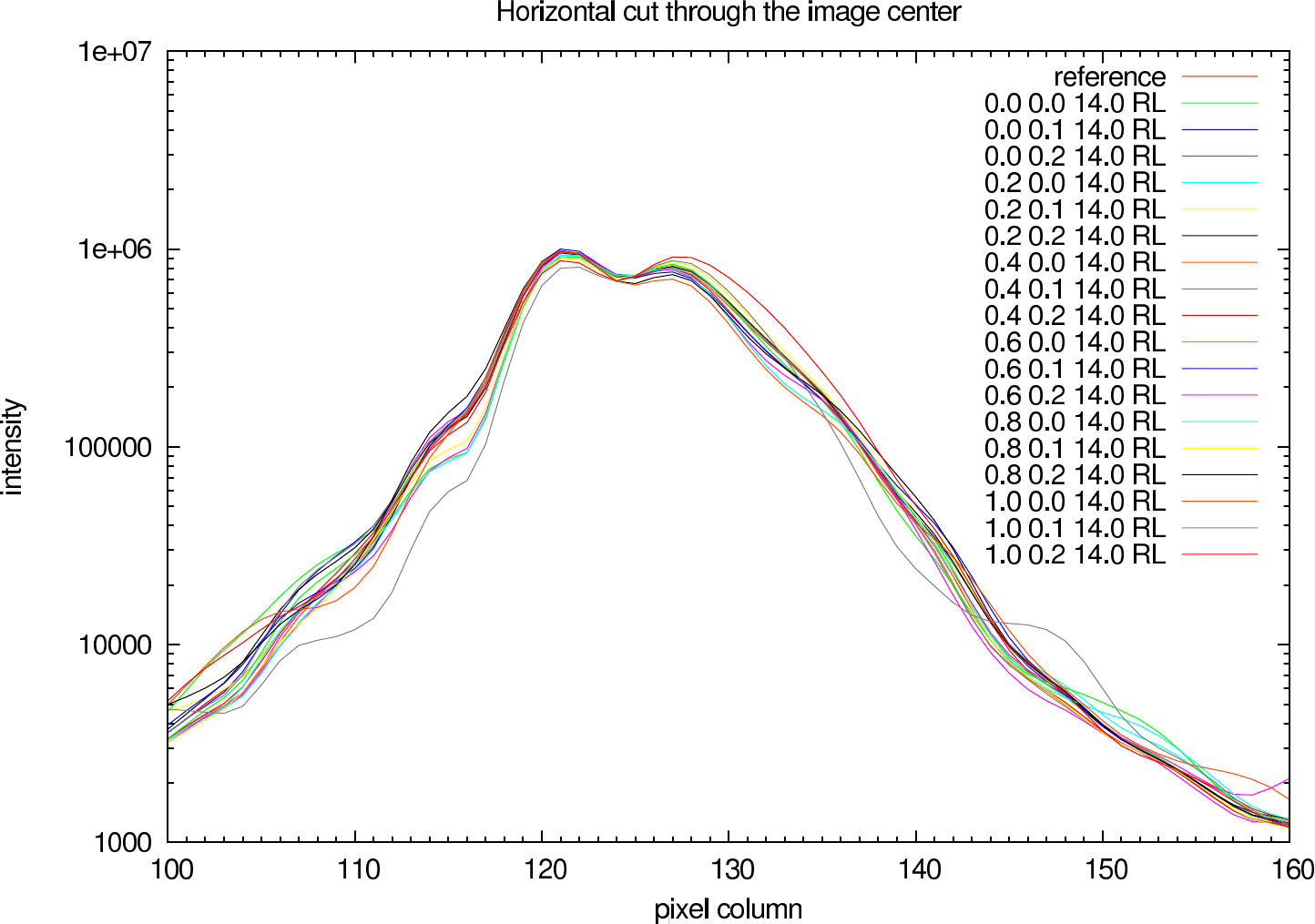 |
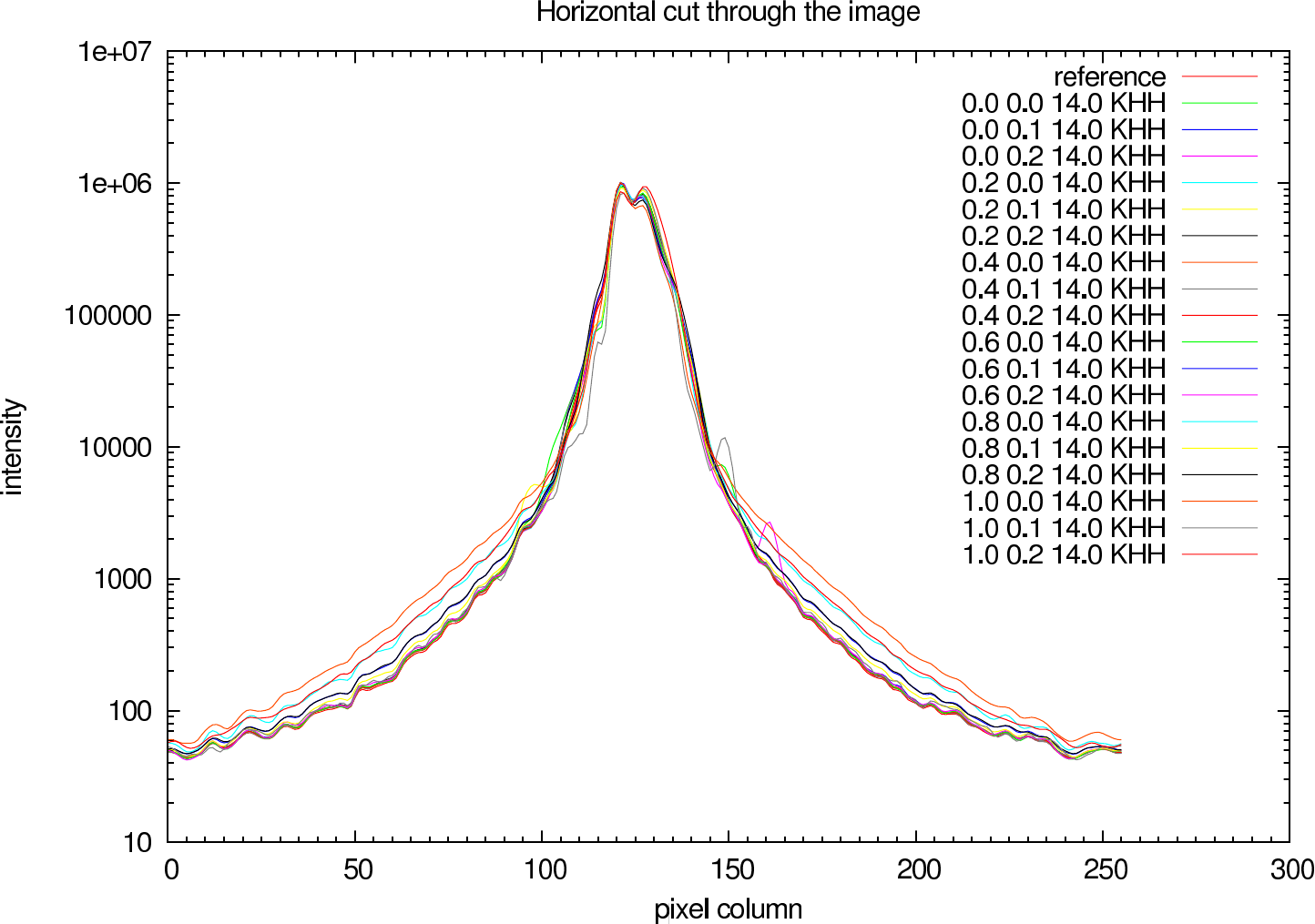 | 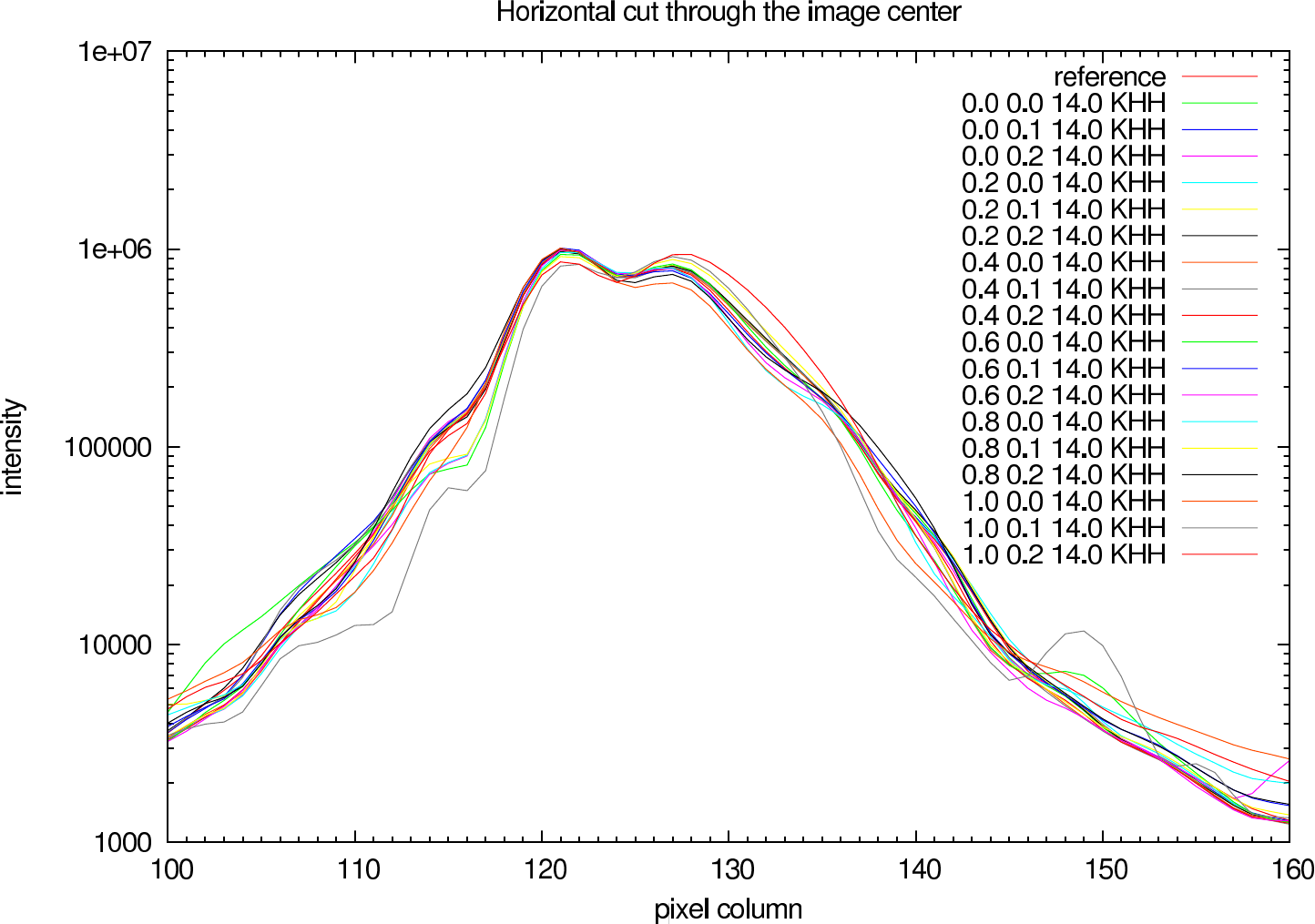 |
The basis of the simulation is an image of a star cluster (see figure 2. The simulated raw images for a position angle of 108 degree are shown in figure 9.
 |  |  |  |
 |  |  |  |
A comparison of the reconstructions depending on the phase error is presented in figure 10 for the J-Band. For the K-Band the results are presented in figure 11.
 |  |  |  |
 |  |  |  |
 |  |  |  |
 |  |  |  |
 |  |  |  |
 |  |  |  |
In table 4 (J-Band) and table 5 (K-Band) the errors for the star cluster depending on the beam position error are presented. In figure 12 the image errors depending on the beam overlap error are shown.
| Testcase | Richardson-Lucy | Building-Block | ||
|---|---|---|---|---|
| Overlap Error | Image Error | Magnitude Error | Image Error | Magnitude Error |
| 0.0 0.0 | 0.016 (0.016) | 0.01, 0.01, 0.08, 0.11, 0.14 | 0.013 (0.013) | 0.01, 0.01, 0.12, 0.13, 0.29 |
| 0.0 0.1 | 0.016 (0.016) | 0.02, 0.02, 0.12, 0.02, 0.17 | 0.014 (0.014) | 0.01, 0.01, 0.16, 0.09, 0.38 |
| 0.0 0.2 | 0.014 (0.014) | 0.01, 0.01, 0.07, 0.08, 0.25 | 0.012 (0.012) | 0.01, 0.00, 0.15, 0.17, 0.67 |
| 0.2 0.0 | 0.017 (0.017) | 0.01, 0.01, 0.05, 0.04, 0.27 | 0.014 (0.014) | 0.01, 0.00, 0.10, 0.12, 0.60 |
| 0.2 0.1 | 0.023 (0.023) | 0.01, 0.01, 0.09, 0.05, 0.20 | 0.014 (0.014) | 0.01, 0.00, 0.17, 0.18, 0.60 |
| 0.2 0.2 | 0.019 (0.019) | 0.01, 0.01, 0.13, 0.10, 0.34 | 0.013 (0.013) | 0.01, 0.00, 0.21, 0.20, 0.71 |
| 0.4 0.0 | 0.051 (0.051) | 0.01, 0.01, 0.01, 0.05, 0.12 | 0.036 (0.036) | 0.02, 0.00, 0.13, 0.22, 0.73 |
| 0.4 0.1 | 0.047 (0.047) | 0.03, 0.02, 0.09, 0.08, 0.16 | 0.036 (0.036) | 0.02, 0.01, 0.18, 0.15, 0.50 |
| 0.4 0.2 | 0.032 (0.032) | 0.03, 0.01, 0.06, 0.06, 0.24 | 0.024 (0.024) | 0.02, 0.00, 0.14, 0.13, 0.58 |
| 0.6 0.0 | 0.117 (0.117) | 0.03, 0.03, 0.24, 0.14, 0.40 | 0.086 (0.085) | 0.03, 0.01, 0.65, 0.60, 2.41 |
| 0.6 0.1 | 0.037 (0.037) | 0.02, 0.01, 0.08, 0.12, 0.04 | 0.028 (0.028) | 0.01, 0.00, 0.19, 0.28, 0.61 |
| 0.6 0.2 | 0.018 (0.018) | 0.01, 0.01, -0.02, 0.10, 0.38 | 0.015 (0.015) | 0.00, 0.00, 0.04, 0.17, 0.73 |
| 0.8 0.0 | 0.061 (0.061) | 0.03, 0.02, 0.08, 0.05, 0.32 | 0.045 (0.045) | 0.03, 0.01, 0.30, 0.37, 2.18 |
| 0.8 0.1 | 0.248 (0.248) | 0.07, 0.07, 0.19, 0.11, 0.39 | 0.193 (0.193) | 0.07, 0.05, 0.71, 0.68, 2.43 |
| 0.8 0.2 | 0.100 (0.100) | 0.04, 0.03, 0.07, 0.13, 0.21 | 0.074 (0.074) | 0.04, 0.02, 0.29, 0.42, 1.72 |
| 1.0 0.0 | 0.105 (0.105) | 0.03, 0.04, 0.16, 0.10, 0.33 | 0.096 (0.095) | 0.03, 0.03, 0.44, 0.44, 2.41 |
| 1.0 0.1 | 0.178 (0.178) | 0.07, 0.07, 0.15, 0.07, 0.54 | 0.149 (0.148) | 0.07, 0.05, 0.56, 0.57, 2.42 |
| 1.0 0.2 | 0.221 (0.221) | 0.07, 0.06, 0.24, 0.12, 0.63 | 0.173 (0.170) | 0.07, 0.05, 0.70, 0.60, 2.42 |
| Testcase | Richardson-Lucy | Building-Block | ||
|---|---|---|---|---|
| Overlap Error | Image Error | Magnitude Error | Image Error | Magnitude Error |
| 0.0 0.0 | 0.047 (0.047) | 0.03, -0.01, 0.42, 0.08, 2.06 | 0.035 (0.035) | 0.03, -0.00, 0.51, 0.16, 1.93 |
| 0.0 0.1 | 0.047 (0.047) | 0.02, -0.01, 0.31, 0.45, 1.62 | 0.033 (0.033) | 0.02, -0.00, 0.35, 0.52, 1.83 |
| 0.0 0.2 | 0.058 (0.058) | 0.07, 0.03, 0.16, 0.74, 2.06 | 0.044 (0.044) | 0.08, 0.03, 0.20, 0.80, 1.94 |
| 0.2 0.0 | 0.048 (0.048) | 0.03, 0.01, -0.02, 0.15, 1.60 | 0.035 (0.035) | 0.03, 0.02, -0.00, 0.20, 1.49 |
| 0.2 0.1 | 0.052 (0.052) | 0.03, 0.01, 0.09, 0.42, 1.75 | 0.040 (0.040) | 0.04, 0.01, 0.12, 0.50, 1.71 |
| 0.2 0.2 | 0.049 (0.049) | 0.00, 0.02, 0.30, 0.21, 0.71 | 0.034 (0.034) | 0.01, 0.02, 0.33, 0.25, 0.89 |
| 0.4 0.0 | 0.061 (0.061) | 0.02, 0.01, 0.87, 0.42, 1.12 | 0.047 (0.047) | 0.03, 0.03, 0.88, 0.47, 1.15 |
| 0.4 0.1 | 0.062 (0.062) | 0.06, 0.01, 0.71, -0.03, 1.86 | 0.048 (0.048) | 0.07, 0.02, 0.76, 0.04, 1.84 |
| 0.4 0.2 | 0.078 (0.078) | 0.04, 0.02, 0.31, 0.41, 0.40 | 0.068 (0.067) | 0.04, 0.03, 0.41, 0.49, 0.60 |
| 0.6 0.0 | 0.096 (0.096) | 0.06, 0.04, 0.29, 0.51, 2.08 | 0.082 (0.079) | 0.08, 0.05, 0.35, 0.55, 1.93 |
| 0.6 0.1 | 0.103 (0.103) | 0.02, 0.08, 0.36, 0.32, 1.11 | 0.092 (0.092) | 0.03, 0.09, 0.45, 0.42, 1.61 |
| 0.6 0.2 | 0.110 (0.110) | 0.05, 0.04, 0.05, 0.80, 2.09 | 0.094 (0.094) | 0.05, 0.04, 0.08, 0.98, 1.93 |
| 0.8 0.0 | 0.107 (0.107) | 0.03, 0.04, 0.12, -0.01, 2.09 | 0.085 (0.085) | 0.04, 0.04, 0.16, 0.08, 1.93 |
| 0.8 0.1 | 0.092 (0.092) | 0.07, 0.03, 0.06, 0.96, 2.08 | 0.075 (0.074) | 0.08, 0.03, 0.15, 1.09, 1.93 |
| 0.8 0.2 | 0.107 (0.107) | 0.07, 0.06, 0.37, 0.63, 2.07 | 0.097 (0.096) | 0.08, 0.08, 0.45, 0.67, 1.93 |
| 1.0 0.0 | 0.264 (0.264) | 0.18, 0.24, 0.40, 1.14, 1.75 | 0.247 (0.245) | 0.18, 0.25, 0.45, 1.26, 1.92 |
| 1.0 0.1 | 0.321 (0.321) | 0.25, 0.36, 0.66, 0.65, 2.08 | 0.305 (0.305) | 0.25, 0.36, 0.67, 0.75, 1.95 |
| 1.0 0.2 | 0.183 (0.183) | 0.19, 0.08, 0.89, 1.24, 1.85 | 0.162 (0.159) | 0.19, 0.09, 0.98, 1.13, 1.92 |
 |  |
 |  |
In figure 13 the image error describing the difference between the reconstruction and the reference image is shown for each iteration (in steps of 100 iterations). The effect of the beam position error on the reconstruction error and the optimal iteration number is clearly visible.
 |  |
 |  |
In the figures figure 14, figure 15, figure 16, and figure 17 the image and photometric errors depending on the overlap error and the iteration number is shown. The overall shape is the same, but the optimum number of iterations is difficult to select, because not all photometric errors have their minimum at the same iteration number.
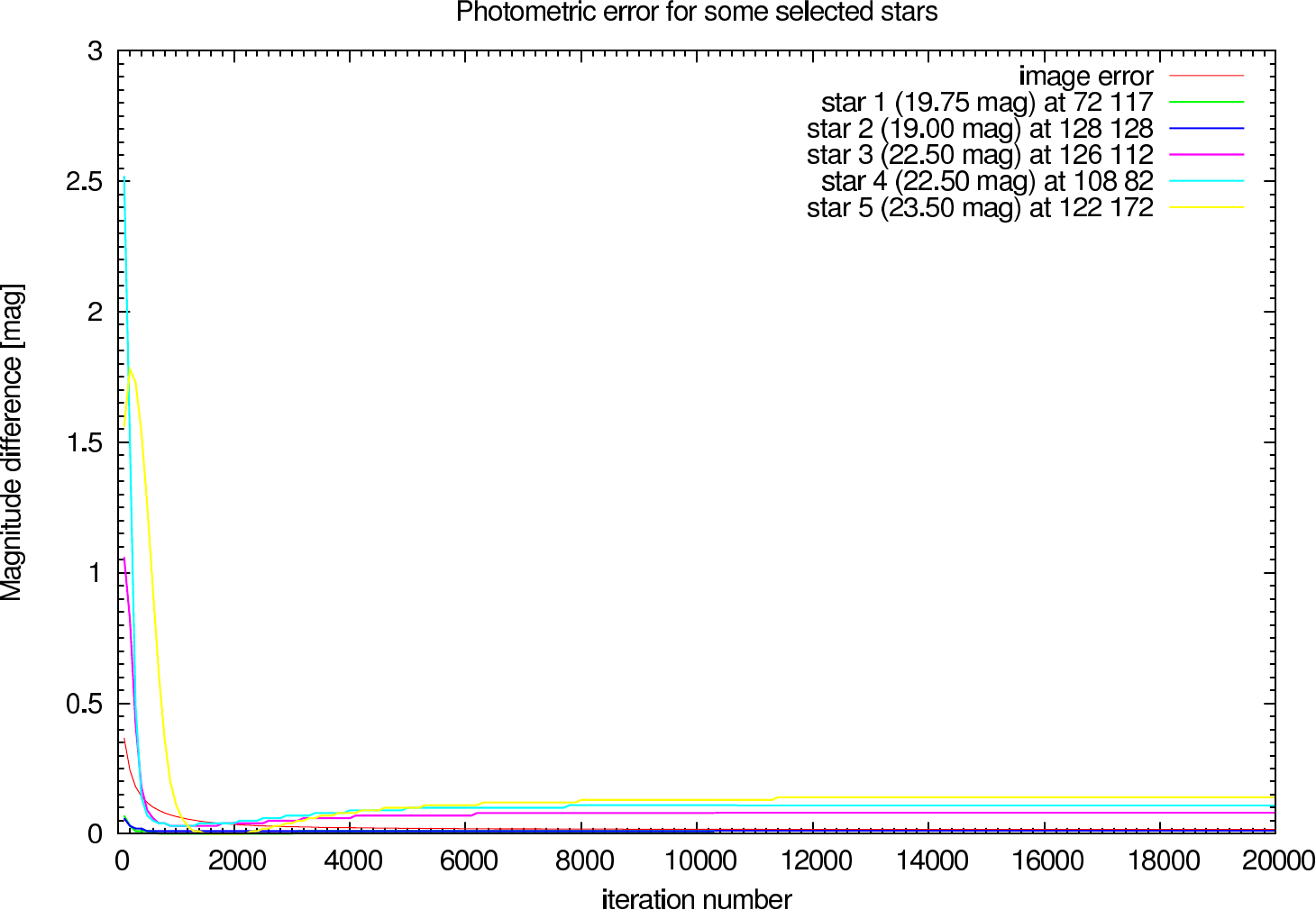 | 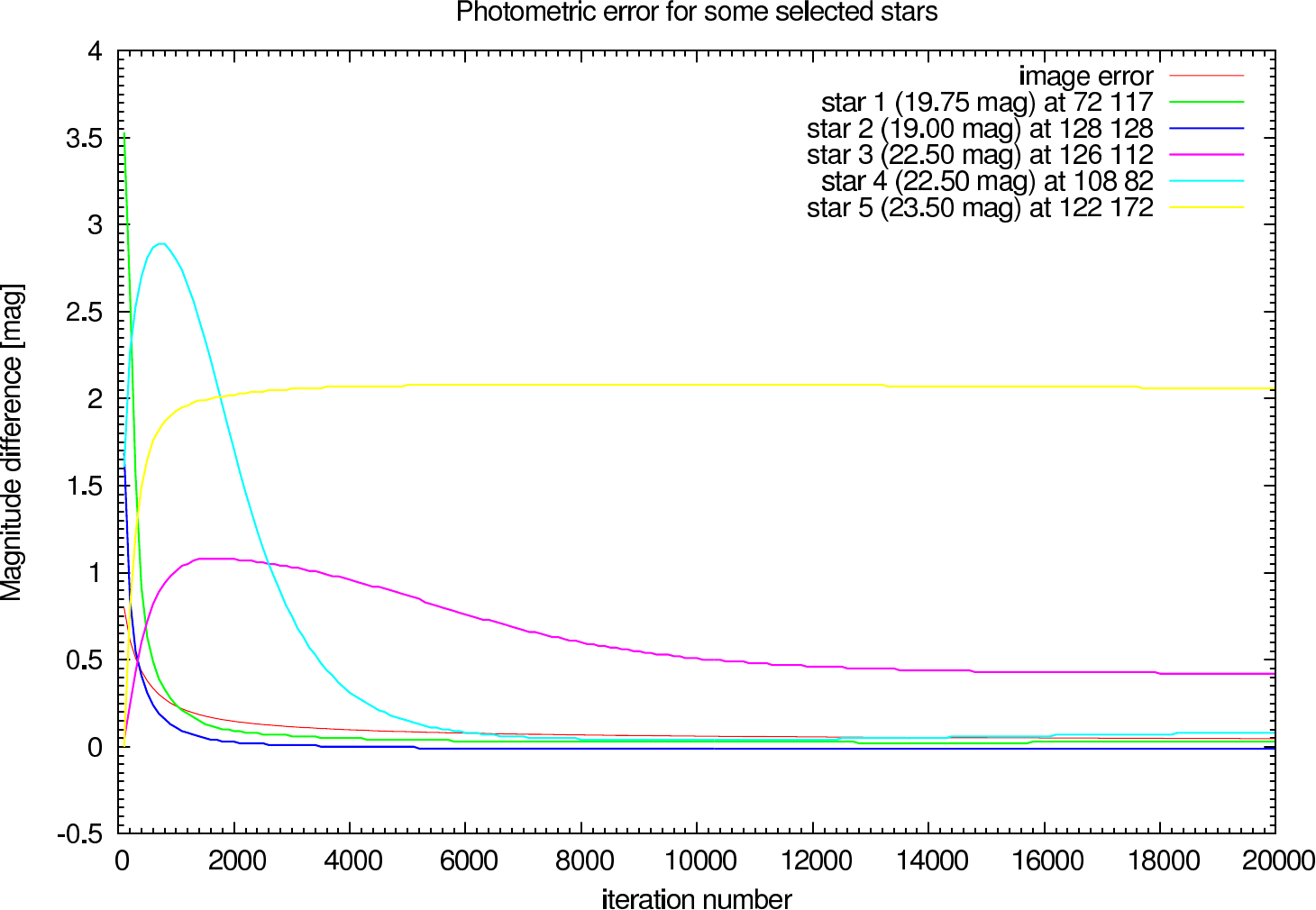 |
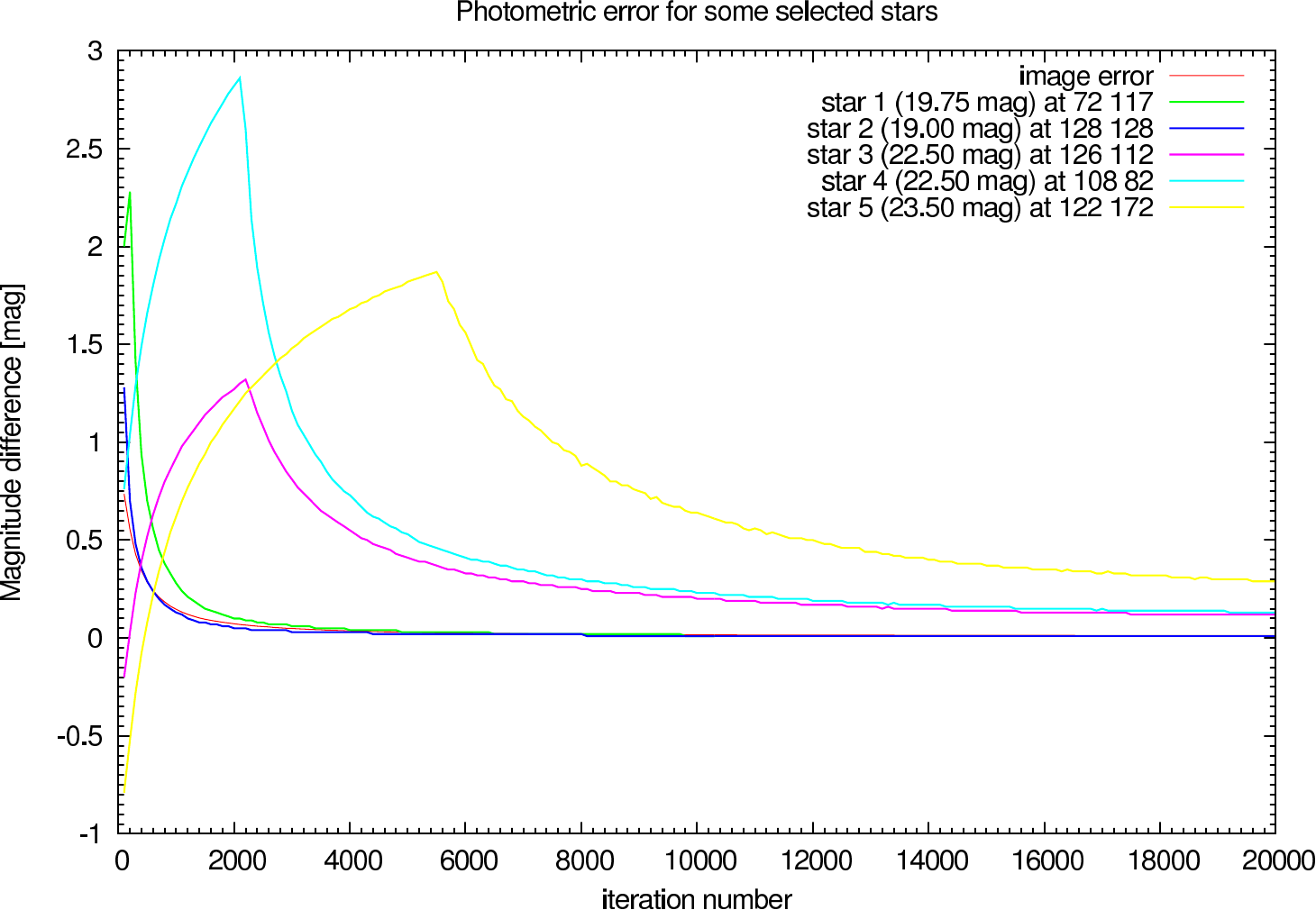 | 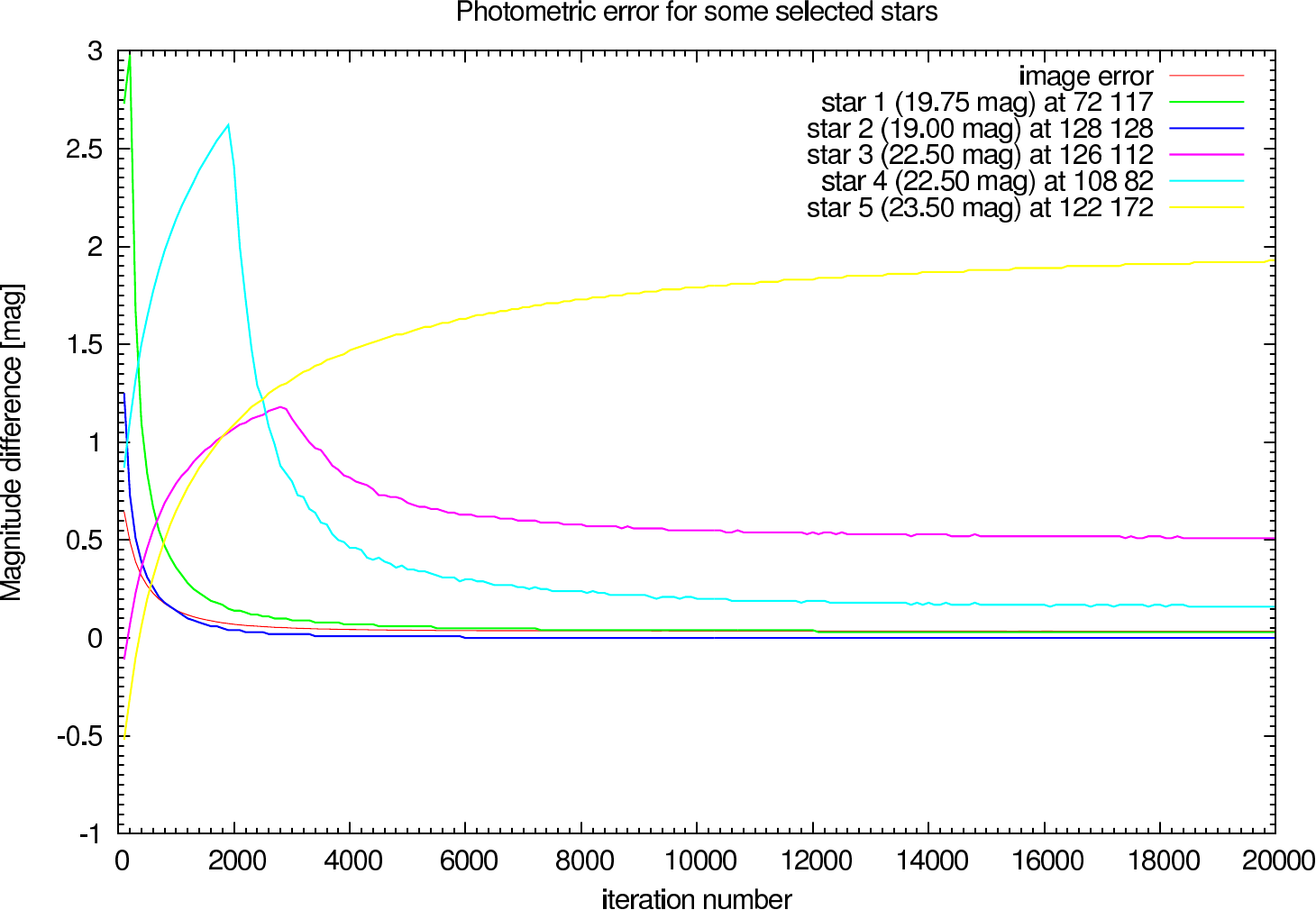 |
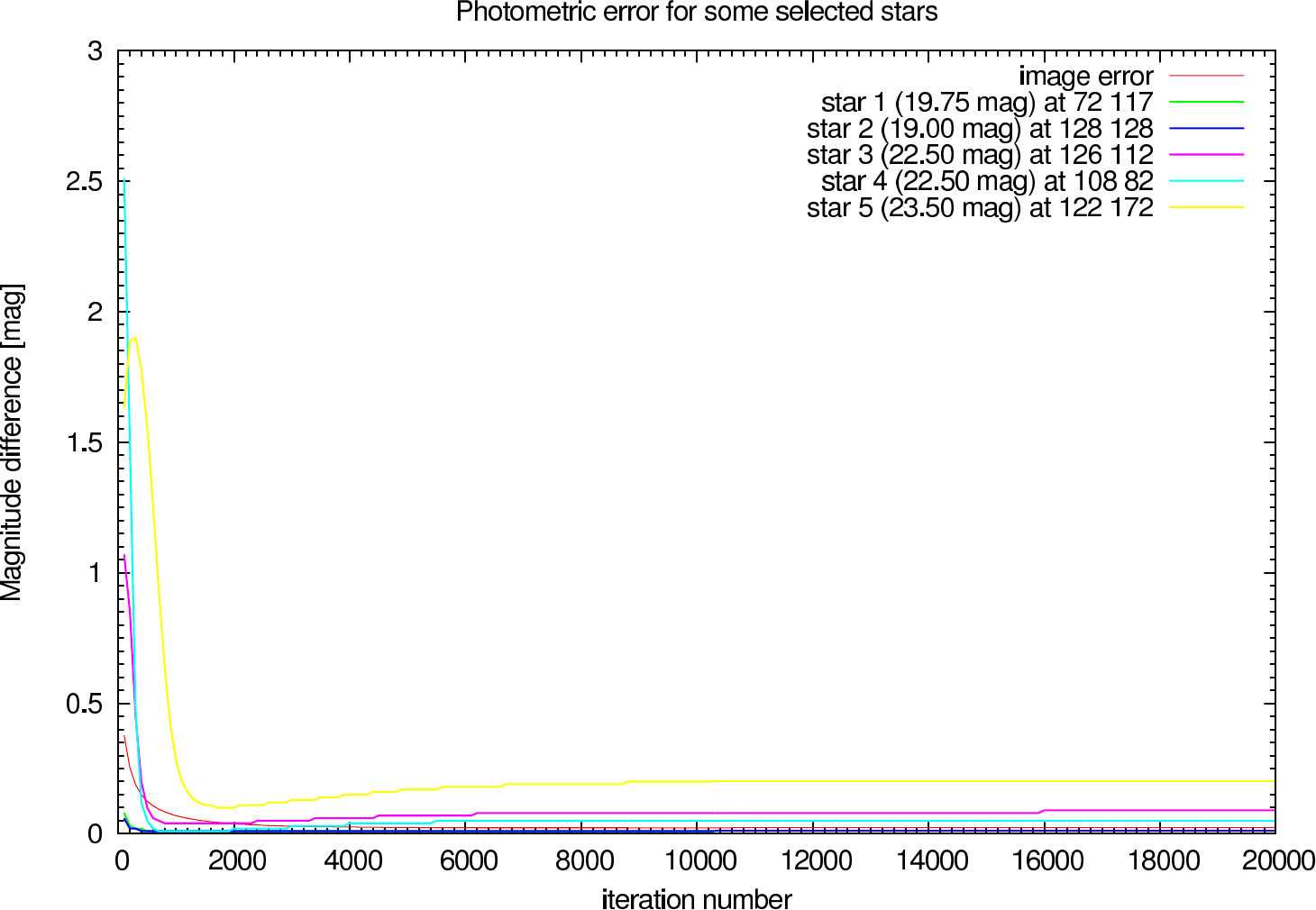 | 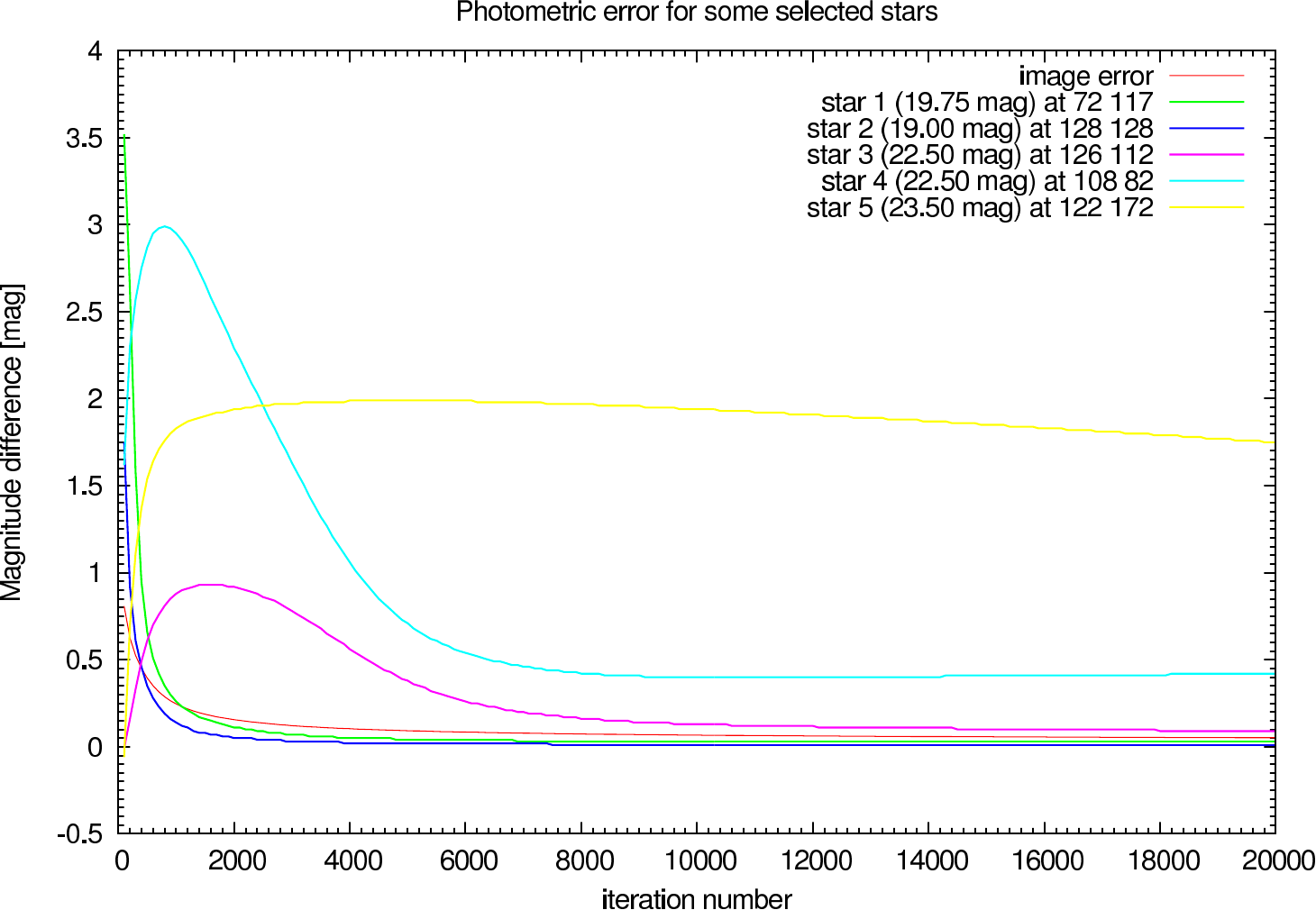 |
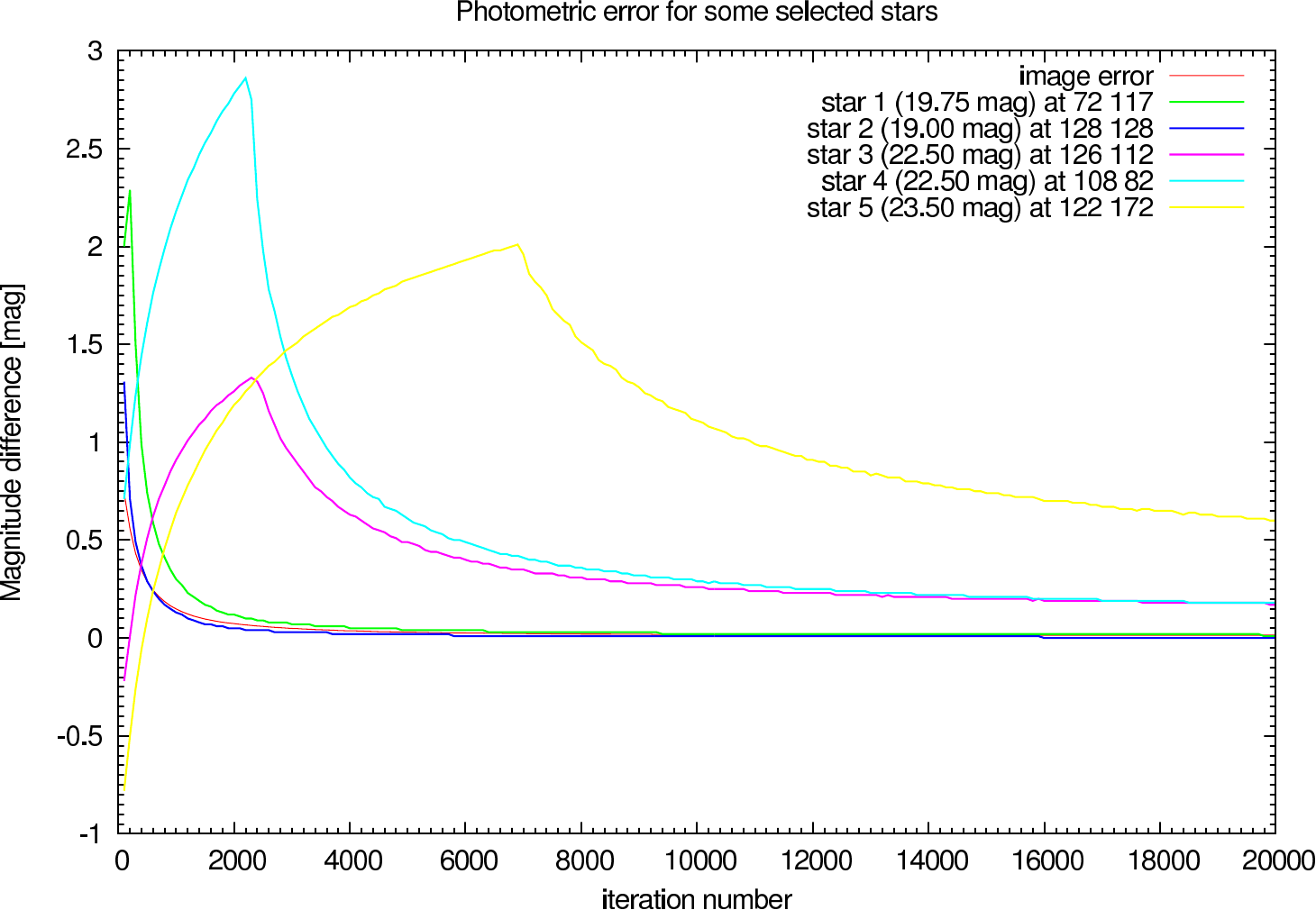 | 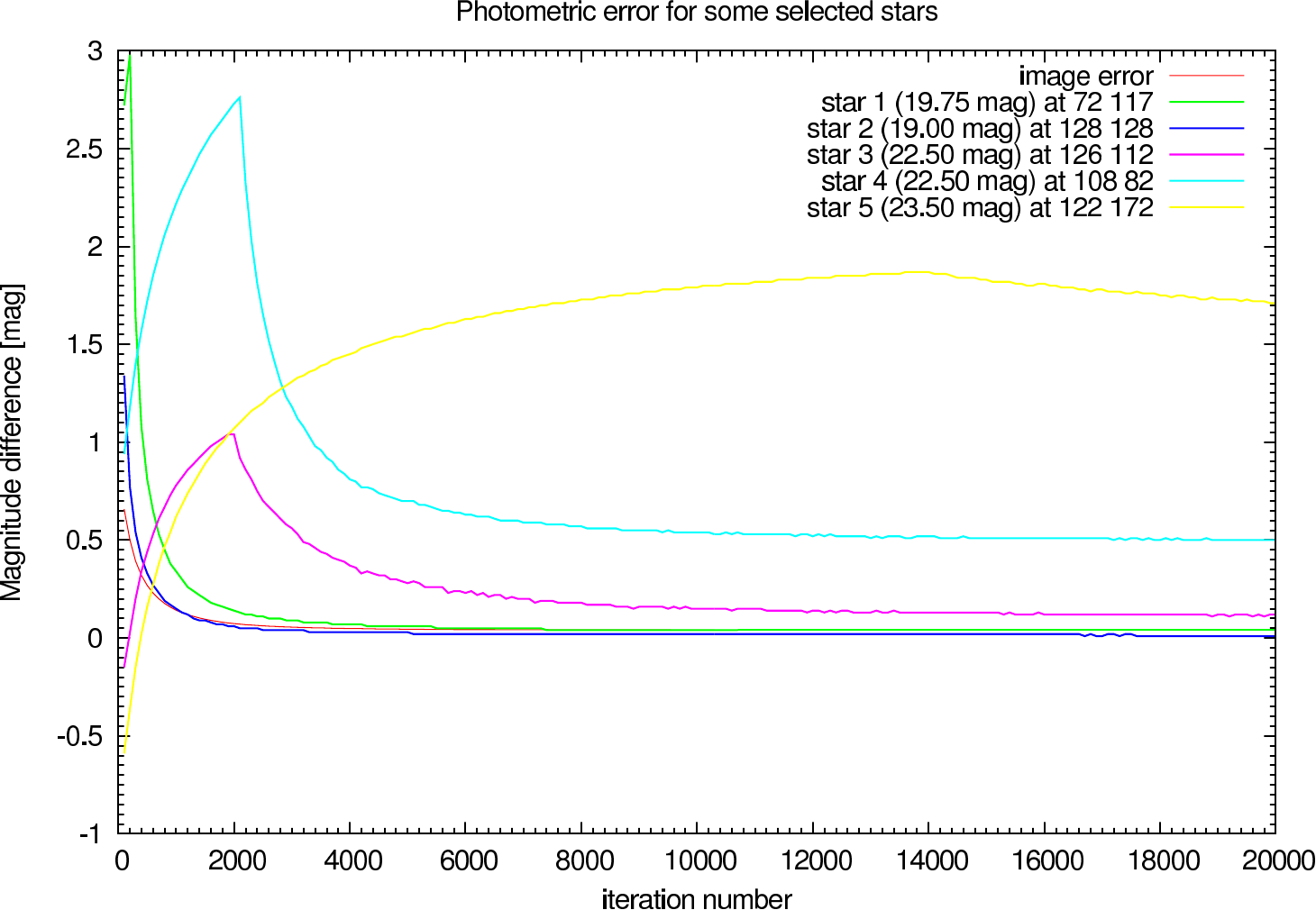 |
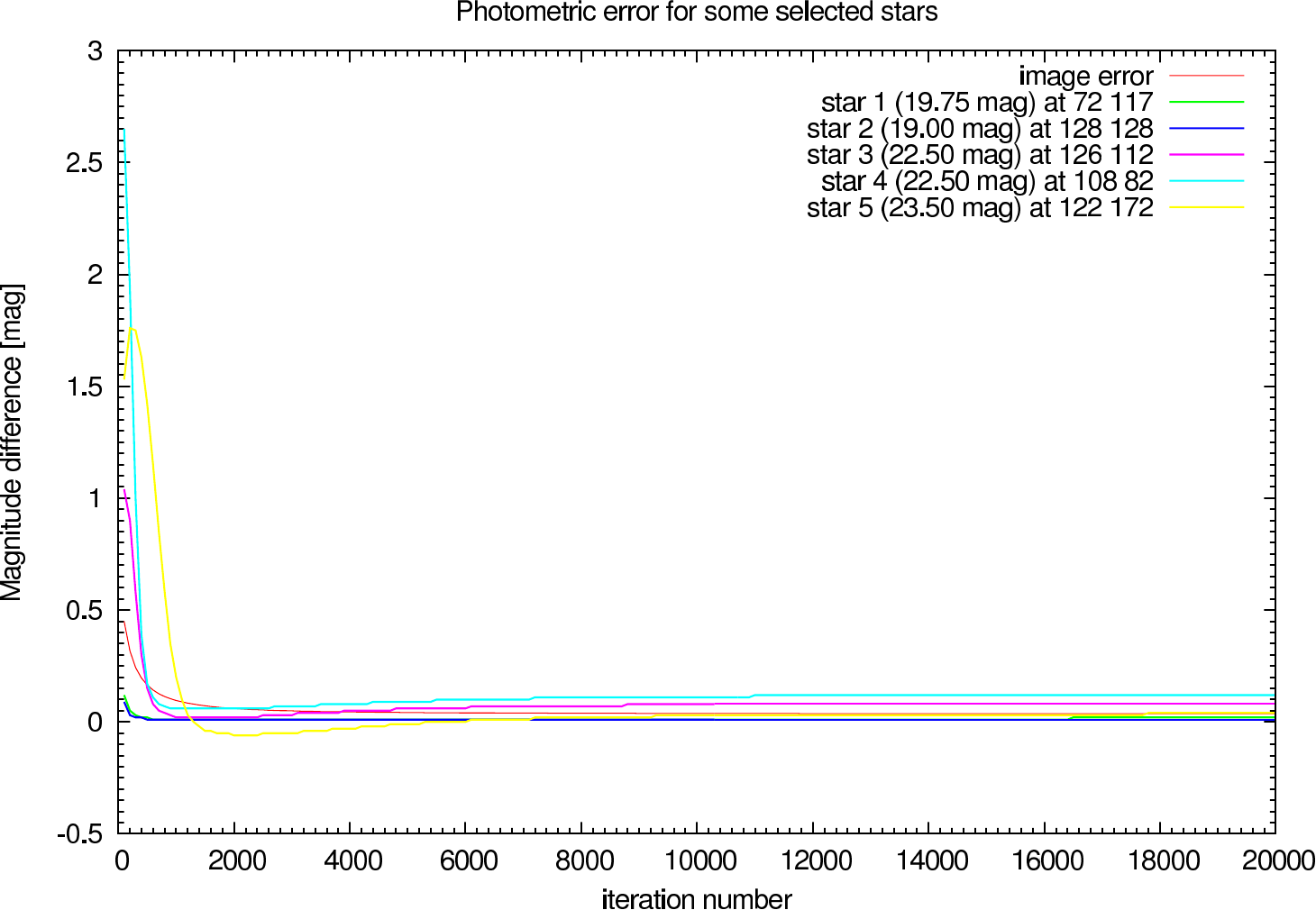 | 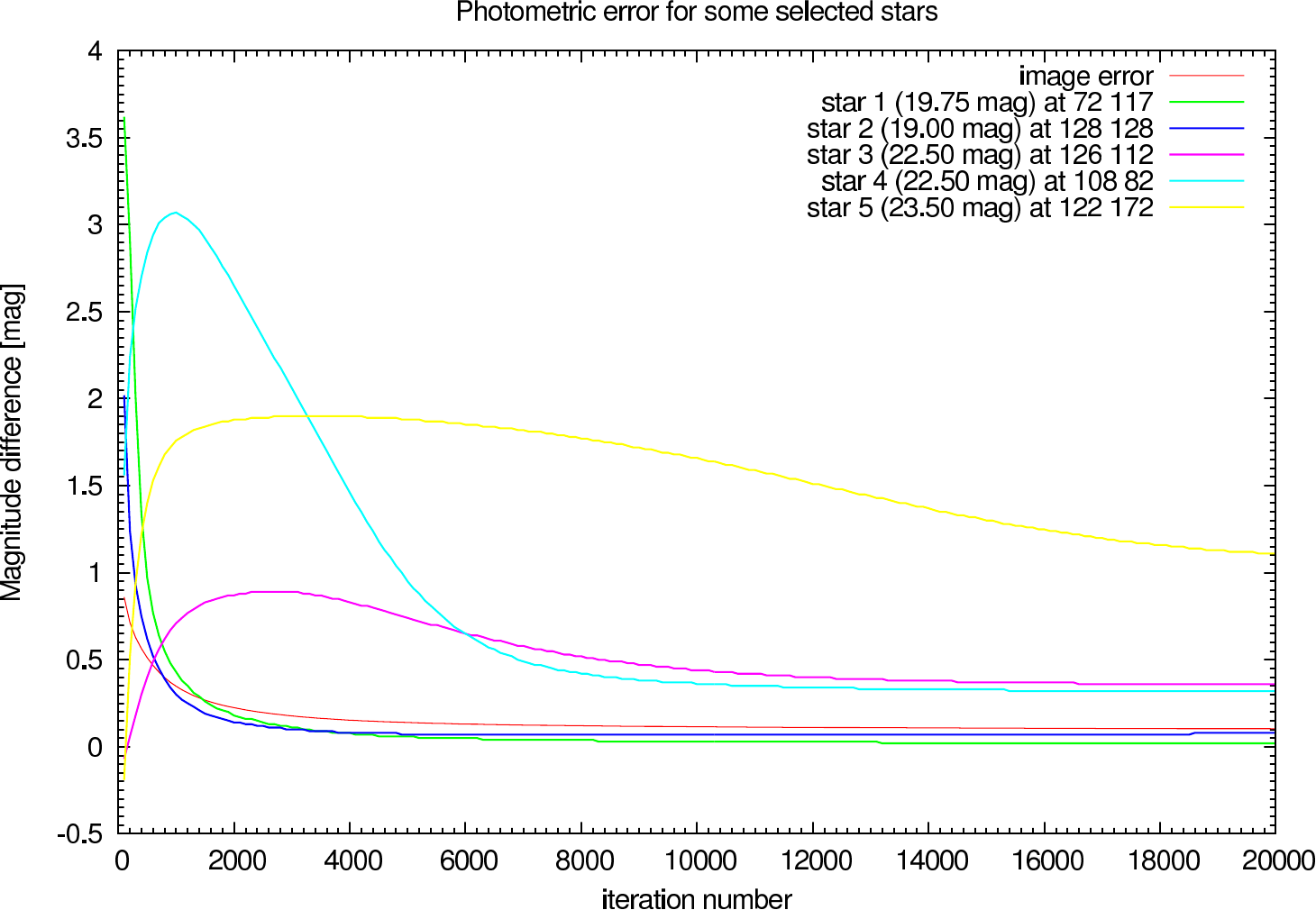 |
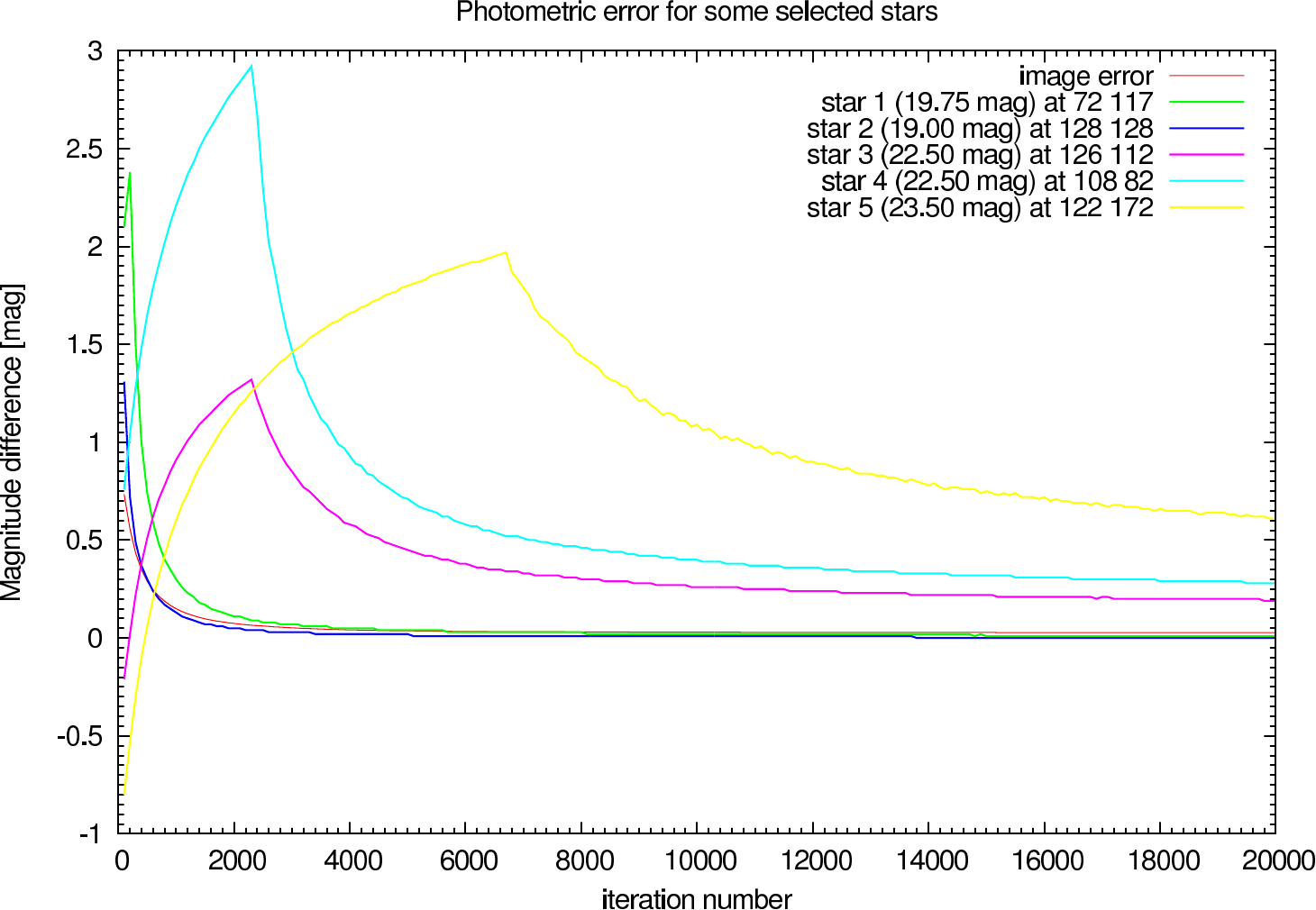 | 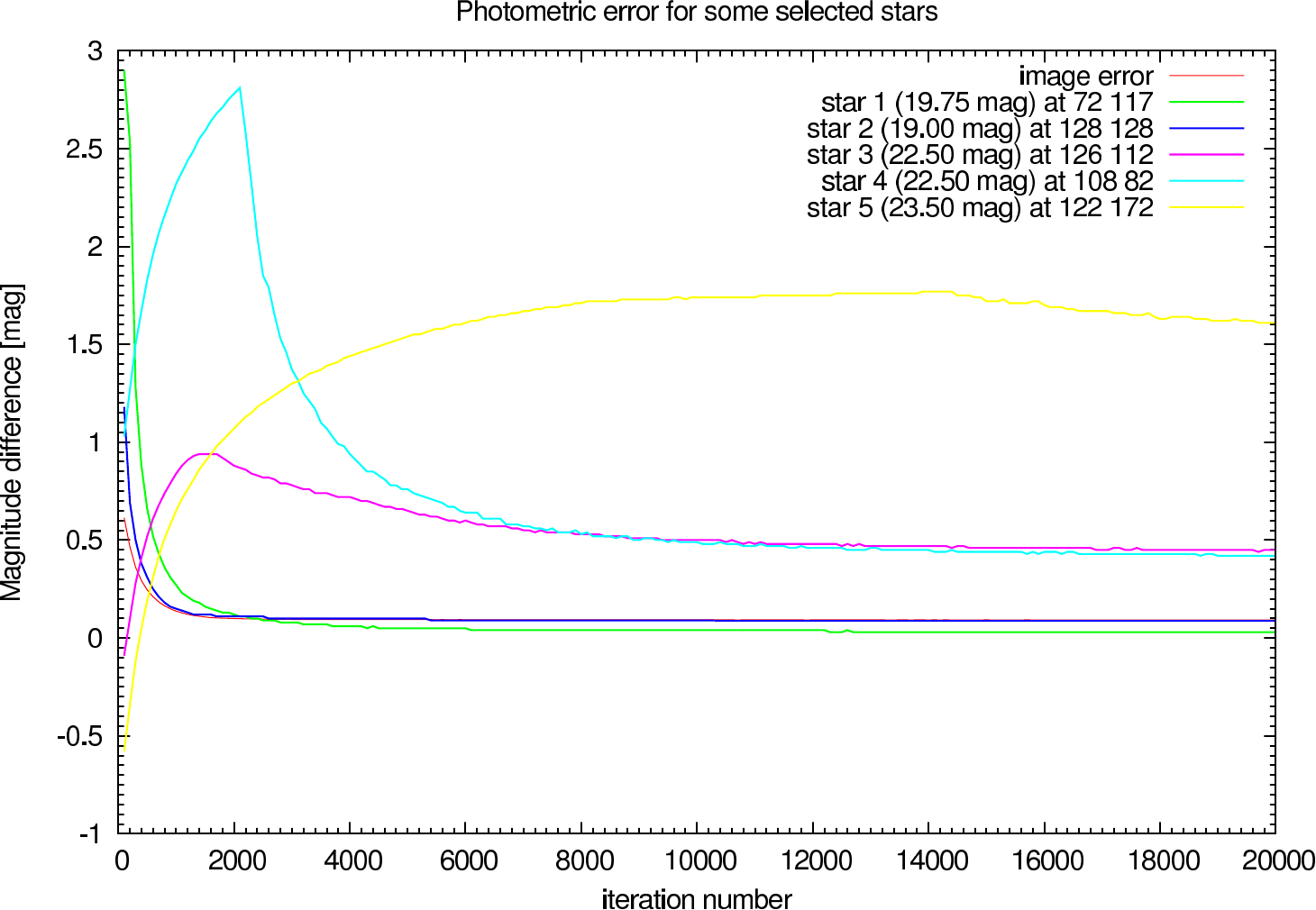 |
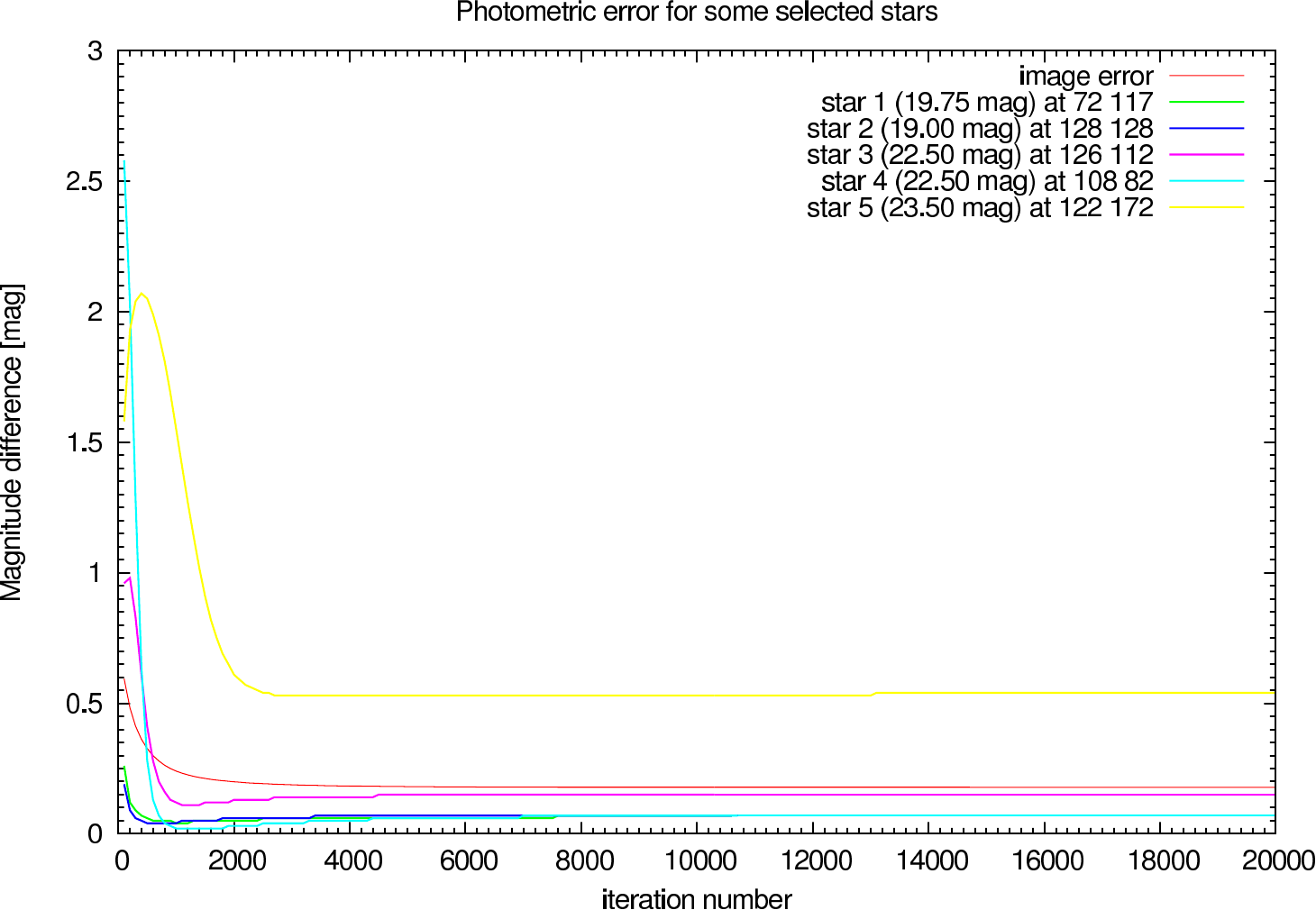 | 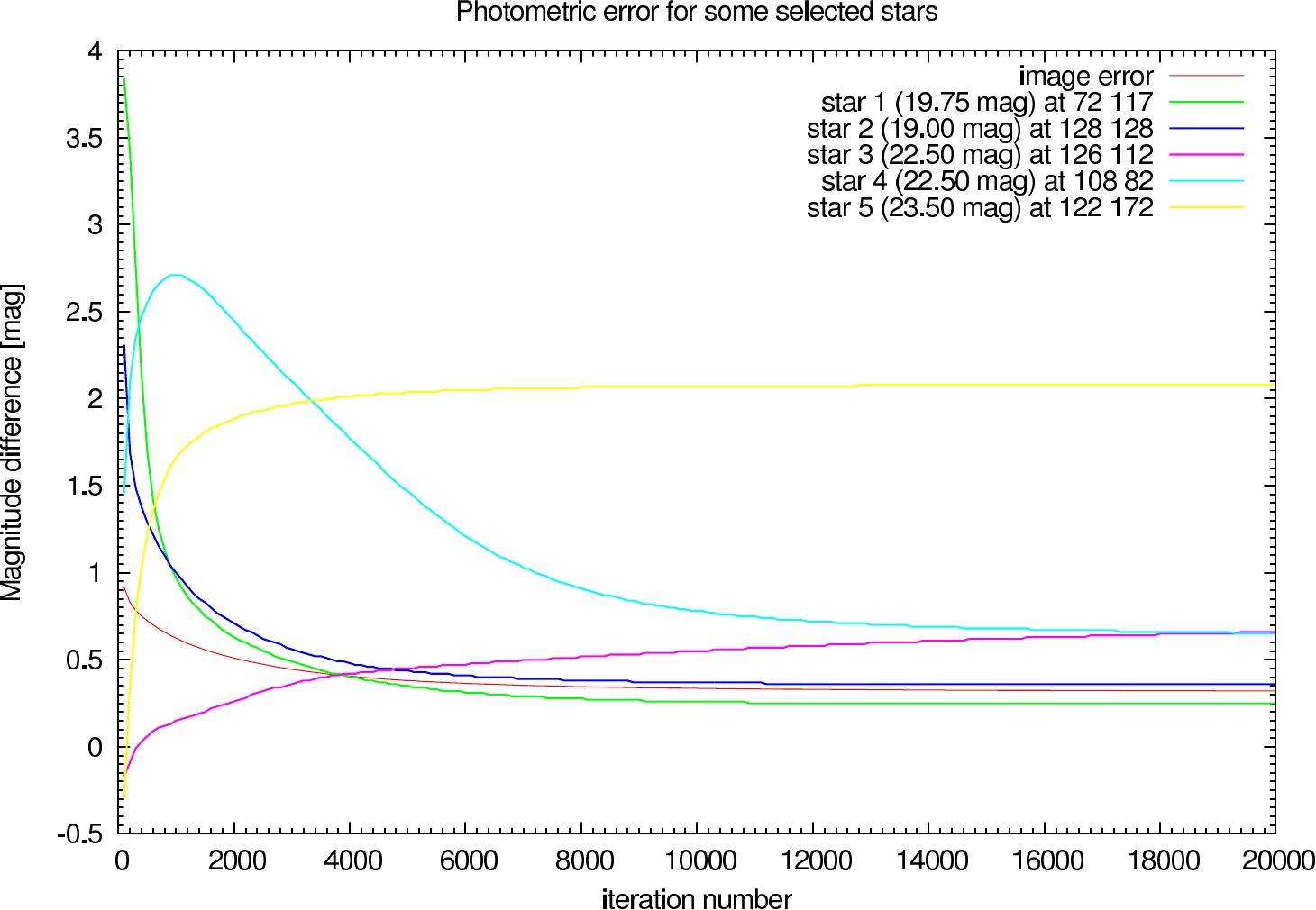 |
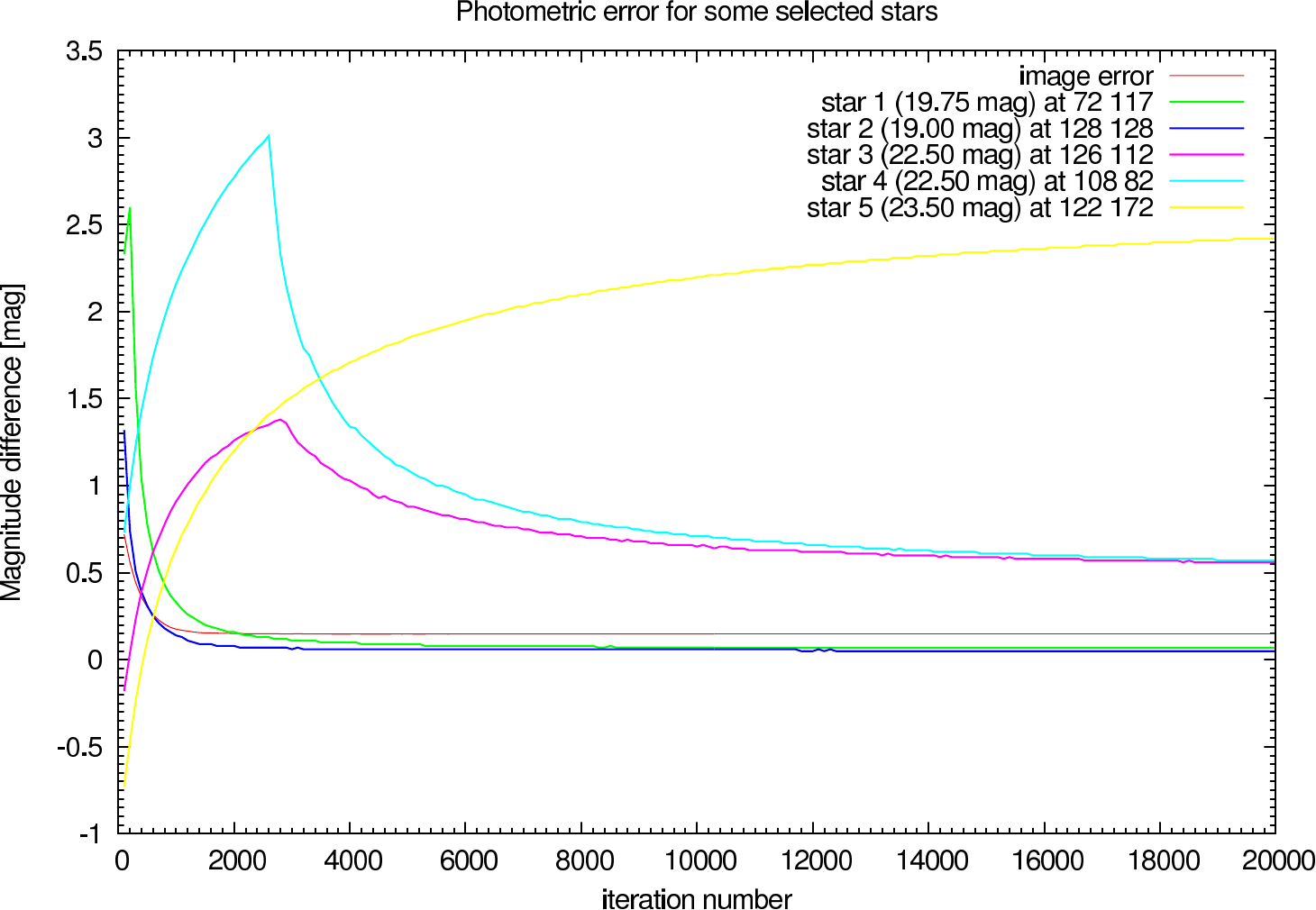 | 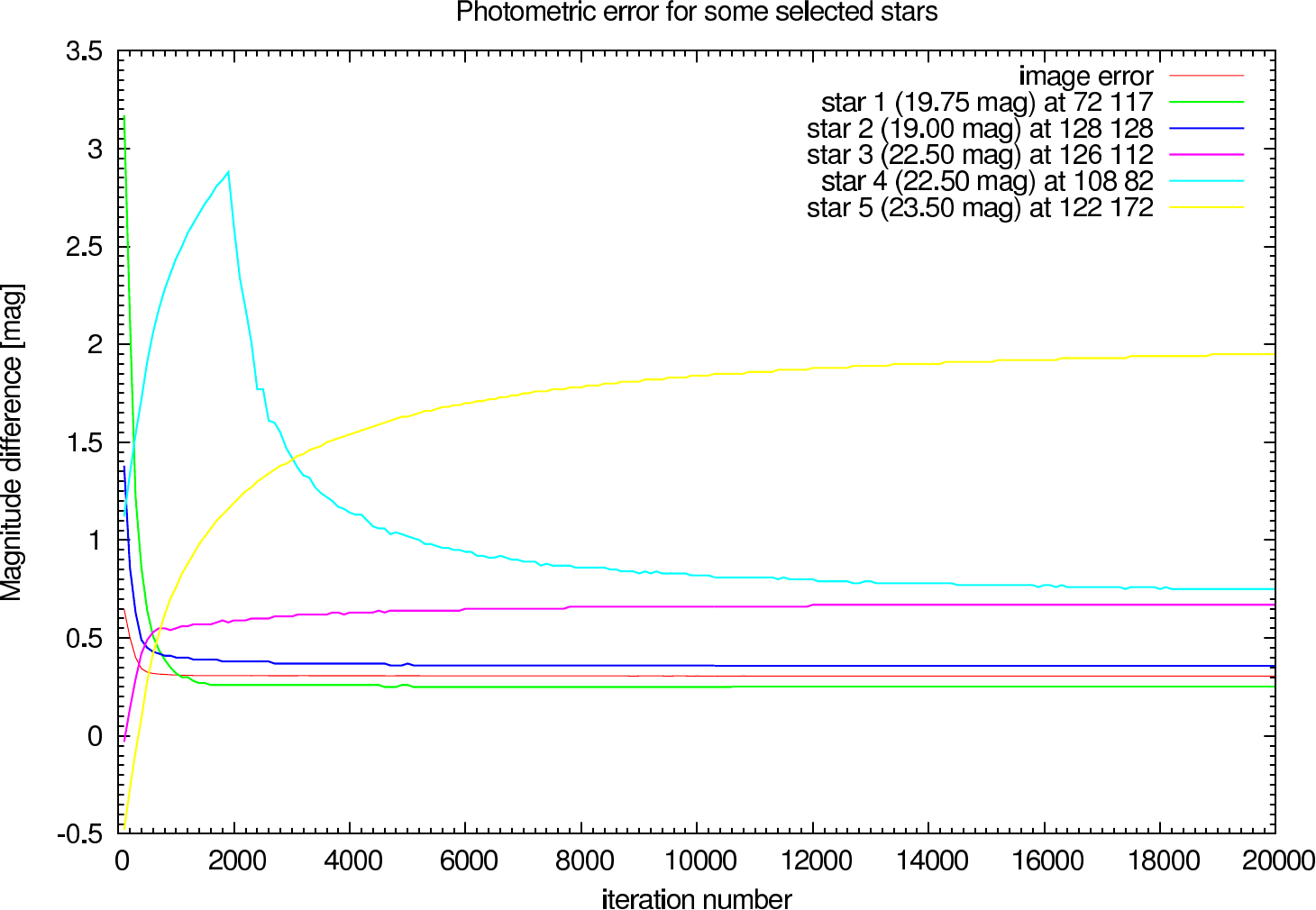 |